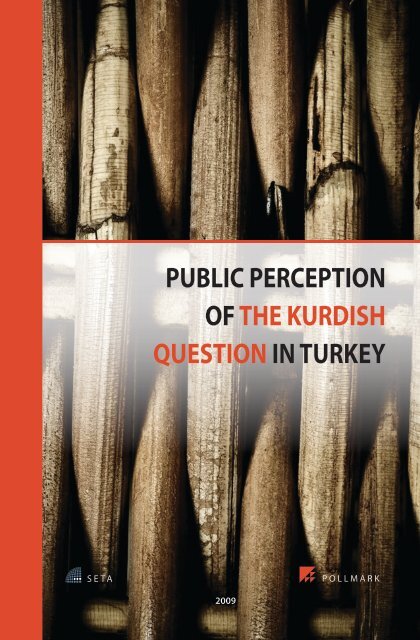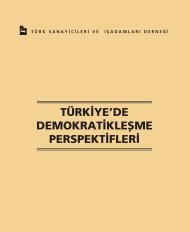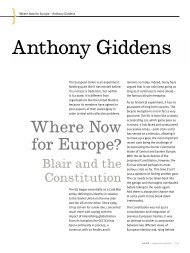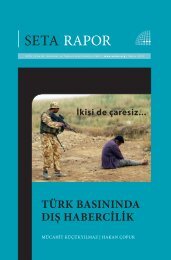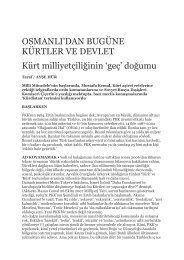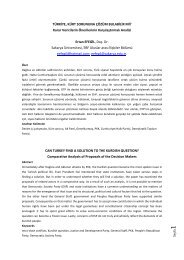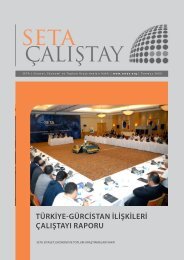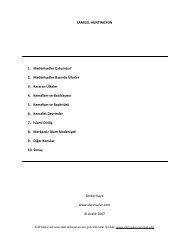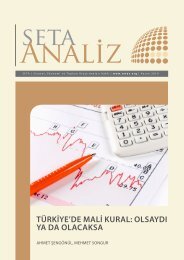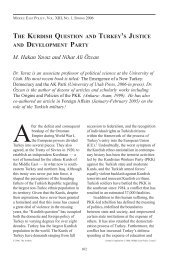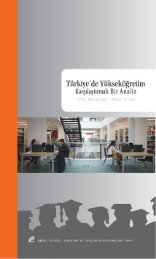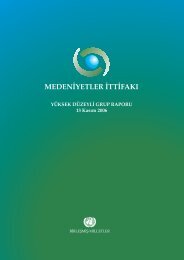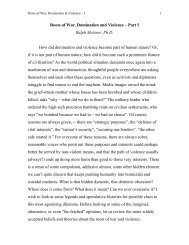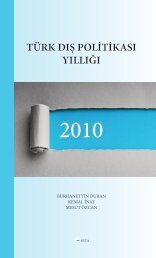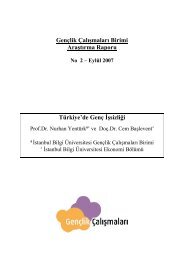public perception of the kurdish question in turkey - the SETA ...
public perception of the kurdish question in turkey - the SETA ...
public perception of the kurdish question in turkey - the SETA ...
Create successful ePaper yourself
Turn your PDF publications into a flip-book with our unique Google optimized e-Paper software.
KAPAK<br />
PUBLIC PERCEPTION<br />
OF THE KURDISH<br />
QUESTION IN TURKEY<br />
<strong>SETA</strong><br />
POLLMARK<br />
2009
P u b l i c P e r c e p t i o n o f t h e K u r d i s h Q u e s t i o n i n T u r k e y<br />
PUBLIC PERCEPTION<br />
OF THE KURDISH<br />
QUESTION IN TURKEY<br />
Bülent Aras<br />
Ertan Aydın<br />
Sel<strong>in</strong> M. Bölme<br />
İhsan Dağı<br />
İbrahim Dalmış<br />
Yılmaz Ensaroğlu<br />
Hatem Ete<br />
Talip Küçükcan<br />
Taha Özhan<br />
Hüsey<strong>in</strong> Yayman<br />
<strong>SETA</strong><br />
FOUNDATION FOR POLITICAL, ECONOMIC AND SOCIAL RESEARCH<br />
POLLMARK<br />
RESEARCH CORPORATION<br />
2009<br />
1
P u b l i c P e r c e p t i o n o f t h e K u r d i s h Q u e s t i o n i n T u r k e y<br />
COPYRIGHT ©2009 by <strong>SETA</strong> & POLLMARK<br />
<strong>SETA</strong><br />
Reşit Galip Cad. Hereke Sk. No.10<br />
GOP Ankara Turkey<br />
Pbx: +90 312 405 61 51<br />
Fax: +90 312 405 69 03<br />
www.setav.org<br />
<strong>in</strong>fo@setav.org<br />
POLLMARK<br />
Cevizlidere Cad. 44/21<br />
Balgat Ankara Turkey<br />
Pbx: +90 312 472 28 18<br />
Fax: +90 312 472 21 17<br />
www.pollmark.com.tr<br />
<strong>in</strong>fo@pollmark.com.tr<br />
First Published <strong>in</strong> 2009 by <strong>SETA</strong><br />
Cover photo: Copyright FreeStockImages.org,<br />
http://www.freestockimages.org<br />
ISBN: 978-605-4023-06-6<br />
All rights reserved.<br />
No part <strong>of</strong> this book may be repr<strong>in</strong>ted or<br />
reproduced or utilized <strong>in</strong> any form or by any<br />
electronic, mechanical or o<strong>the</strong>r means, without<br />
permission <strong>in</strong> writ<strong>in</strong>g from <strong>the</strong> publishers.<br />
Pr<strong>in</strong>ted <strong>in</strong> Turkey, October 2009<br />
Design & Layout by Harun Tan, Ümare Yazar<br />
2
P u b l i c P e r c e p t i o n o f t h e K u r d i s h Q u e s t i o n i n T u r k e y<br />
PREFACE<br />
9<br />
EXECUTIVE SUMMARY<br />
11<br />
CHAPTER 1<br />
RESEARCH METHODOLOGY<br />
CHAPTER 2<br />
PROBLEMS AND COMMON GROUND<br />
CHAPTER 3<br />
HOW TO RESOLVE THE KURDISH QUESTION?<br />
CHAPTER 4<br />
DEMOCRATIZATION INITIATIVE AND POLITICAL PARTIES<br />
CHAPTER 5<br />
FEARS AND ANXIETIES<br />
CHAPTER 6<br />
SOCIETAL PERCEPTION OF KURDS<br />
CHAPTER 7<br />
TURKS & KURDS: HOW FAR, HOW CLOSE?<br />
13<br />
17<br />
27<br />
39<br />
51<br />
59<br />
67<br />
3
P u b l i c P e r c e p t i o n o f t h e K u r d i s h Q u e s t i o n i n T u r k e y<br />
4
P u b l i c P e r c e p t i o n o f t h e K u r d i s h Q u e s t i o n i n T u r k e y<br />
TABLE OF CONTENTS<br />
PREFACE | 9<br />
EXECUTIVE SUMMARY | 11<br />
CHAPTER 1<br />
RESEARCH METHODOLOGY | 13<br />
CHAPTER 2<br />
PROBLEMS AND COMMON GROUND | 17<br />
1 In your op<strong>in</strong>ion, what is <strong>the</strong> most crucial problem <strong>of</strong> Turkey? | 20<br />
2 In your view, what is <strong>the</strong> most important bond which holds people <strong>of</strong> different orig<strong>in</strong>s<br />
such as Turkish, Kurdish, Laz or Circassian toge<strong>the</strong>r <strong>in</strong> Turkey? | 21<br />
3 What is <strong>the</strong> most important source <strong>of</strong> Kurdish <strong>question</strong>? | 23<br />
4 How important is it to be a citizen <strong>of</strong> Re<strong>public</strong> <strong>of</strong> Turkey for you? | 25<br />
5 How effective is <strong>the</strong> existence <strong>of</strong> shared beliefs among <strong>the</strong> Kurdish and Turkish groups<br />
for <strong>the</strong>ir co-existence? | 26<br />
CHAPTER 3<br />
HOW TO RESOLVE THE KURDISH QUESTION? | 27<br />
6 In your op<strong>in</strong>ion, is <strong>the</strong> Kurdish <strong>question</strong> an important problem <strong>of</strong> Turkey? | 30<br />
7 Do you th<strong>in</strong>k <strong>the</strong> policies implemented <strong>in</strong> <strong>the</strong> last 25 years aga<strong>in</strong>st terrorism have been<br />
successful? | 31<br />
8 In your op<strong>in</strong>ion, which actors will be <strong>the</strong> most effective <strong>in</strong> <strong>the</strong> process <strong>of</strong> settlement <strong>of</strong><br />
<strong>the</strong> Kurdish <strong>question</strong>? | 33<br />
5
P u b l i c P e r c e p t i o n o f t h e K u r d i s h Q u e s t i o n i n T u r k e y<br />
9 Do you th<strong>in</strong>k <strong>the</strong> neutralization <strong>of</strong> <strong>the</strong> PKK by Turkish Military Forces would resolve <strong>the</strong><br />
Kurdish <strong>question</strong>? | 34<br />
10 Do you th<strong>in</strong>k that an agreement on <strong>the</strong> settlement <strong>of</strong> <strong>the</strong> Kurdish <strong>question</strong> among <strong>the</strong><br />
political parties (AK Parti, CHP, MHP, DTP) represented <strong>in</strong> <strong>the</strong> Grand National Assembly<br />
<strong>of</strong> Turkey would resolve <strong>the</strong> Kurdish <strong>question</strong> | 35<br />
11 Do you th<strong>in</strong>k an agreement on <strong>the</strong> settlement <strong>of</strong> <strong>the</strong> Kurdish <strong>question</strong> among all state<br />
<strong>in</strong>stitutions, <strong>in</strong>clud<strong>in</strong>g <strong>the</strong> Government and Turkish Military Forces, would resolve <strong>the</strong><br />
Kurdish <strong>question</strong>? | 36<br />
12 Do you th<strong>in</strong>k, PKK’s giv<strong>in</strong>g up <strong>of</strong> arms and participation <strong>of</strong> its members <strong>in</strong> civil life would<br />
settle <strong>the</strong> Kurdish <strong>question</strong>? | 32<br />
CHAPTER 4<br />
DEMOCRATIZATION INITIATIVE AND POLITICAL PARTIES | 39<br />
13 What do you th<strong>in</strong>k <strong>of</strong> <strong>the</strong> government’s recent <strong>in</strong>itiative for <strong>the</strong> settlement <strong>of</strong> <strong>the</strong> Kurdish<br />
<strong>question</strong>? | 42<br />
14 What is your op<strong>in</strong>ion on <strong>the</strong> CHP’s approach to <strong>the</strong> government’s Kurdish <strong>in</strong>itiative? | 43<br />
15 What is your op<strong>in</strong>ion on <strong>the</strong> MHP’s approach to <strong>the</strong> government’s Kurdish <strong>in</strong>itiative? | 45<br />
16 What is your op<strong>in</strong>ion on <strong>the</strong> DTP’s approach to <strong>the</strong> government’s Kurdish <strong>in</strong>itiative? | 47<br />
17 What is your view on launch<strong>in</strong>g a Kurdish TRT-6 <strong>in</strong> <strong>the</strong> state’s <strong>of</strong>ficial broadcast<strong>in</strong>g<br />
system? | 48<br />
18 Prime M<strong>in</strong>ister and government’s effort to settle <strong>the</strong> Kurdish <strong>question</strong> have been<br />
criticized as separatism. Do you agree with this claim? | 49<br />
CHAPTER 5<br />
FEARS AND ANXIETIES | 51<br />
19 Do you th<strong>in</strong>k that <strong>the</strong> recognition <strong>of</strong> fur<strong>the</strong>r cultural rights to <strong>the</strong> Kurds for <strong>the</strong> settlement<br />
<strong>of</strong> <strong>the</strong> Kurdish <strong>question</strong> would lead to dis<strong>in</strong>tegration <strong>of</strong> Turkey? | 54<br />
20 Is it acceptable to lift <strong>the</strong> bans on <strong>the</strong> use <strong>of</strong> Kurdish language for <strong>the</strong> settlement <strong>of</strong> <strong>the</strong><br />
Kurdish <strong>question</strong>? | 56<br />
21 Is it acceptable to recognize <strong>the</strong> Kurdish identity constitutionally for <strong>the</strong> settlement <strong>of</strong><br />
<strong>the</strong> Kurdish <strong>question</strong>? | 58<br />
6
P u b l i c P e r c e p t i o n o f t h e K u r d i s h Q u e s t i o n i n T u r k e y<br />
CHAPTER 6<br />
SOCIETAL PERCEPTION OF KURDS | 59<br />
22 In your op<strong>in</strong>ion, do <strong>the</strong> Kurds want to have a separate state? | 63<br />
23 In your op<strong>in</strong>ion, do <strong>the</strong> political views <strong>of</strong> DTP represent all Kurds <strong>in</strong> Turkey? | 64<br />
24 In your op<strong>in</strong>ion, do <strong>the</strong> political views <strong>of</strong> Abdullah Öcalan and <strong>the</strong> PKK represent all<br />
Kurds <strong>in</strong> Turkey? | 65<br />
25 In your op<strong>in</strong>ion, is <strong>the</strong>re a structural l<strong>in</strong>k between <strong>the</strong> DTP and <strong>the</strong> PKK? | 66<br />
CHAPTER 7<br />
TURKS & KURDS: HOW FAR, HOW CLOSE? | 67<br />
26 What is your op<strong>in</strong>ion on Turks/Kurds? | 71<br />
27 Is <strong>the</strong>re a Turk/Kurd among your close relatives? | 72<br />
28 Is <strong>the</strong>re a Turk/Kurd among your close friends? | 73<br />
29 Is <strong>the</strong>re a Turk/Kurd among your neighbors? | 74<br />
30 Would you be disturbed if a Turk/Kurd becomes your relative through marriage ties? | 75<br />
31 Can you accept a Turk/Kurd as a close friend? | 76<br />
32 Would you be disturbed if you have a Turkish/a Kurdish neighbor? | 77<br />
33 Would you be disturbed if you have a Turkish or Kurdish colleague? | 78<br />
7
P u b l i c P e r c e p t i o n o f t h e K u r d i s h Q u e s t i o n i n T u r k e y<br />
ACRONYMS<br />
AK Parti: Adalet ve Kalkınma Partisi; The Justice and Development Party.<br />
CHP: Cumhuriyet Halk Partisi; The Re<strong>public</strong>an People’s Party.<br />
MHP: Milliyetçi Hareket Partisi; The Nationalist Movement Party.<br />
DTP: Demokratik Toplum Partisi; The Democratic Society Party.<br />
TBMM: Türkiye Büyük Millet Meclisi; The Grand National Assembly <strong>of</strong> Turkey.<br />
TRT-6: Türkiye Radyo Televizyon Kurumu; The Turkish Radio and Television Corporation-6<br />
(broadcast<strong>in</strong>g <strong>in</strong> Kurdish).<br />
PKK: Kürdistan İşçi Partisi; The Kurdistan Workers’ Party.<br />
<strong>SETA</strong>: Siyaset, Ekonomi ve Toplum Araştırmaları Vakfı; The Foundation for Political, Economic and<br />
Social Research.<br />
Pollmark: Pollmark Araştırma Kurumu; The Pollmark Research Corporation.<br />
8
P u b l i c P e r c e p t i o n o f t h e K u r d i s h Q u e s t i o n i n T u r k e y<br />
PREFACE<br />
“Public Perception <strong>of</strong> <strong>the</strong> Kurdish Question” is based on a Turkey-wide survey conducted<br />
by <strong>the</strong> Foundation for Political, Economic and Social Research (<strong>SETA</strong>) and Pollmark.* The<br />
ma<strong>in</strong> objective <strong>of</strong> this large-scale survey was to map <strong>public</strong> <strong>perception</strong>s <strong>of</strong> <strong>the</strong> Kurdish<br />
<strong>question</strong> and <strong>the</strong> government’s <strong>in</strong>tensively debated Democratization Initiative or <strong>in</strong> o<strong>the</strong>r<br />
words, Kurdish Initiative. This report presents <strong>the</strong> ma<strong>in</strong> f<strong>in</strong>d<strong>in</strong>gs <strong>of</strong> <strong>the</strong> survey.<br />
This is not <strong>the</strong> first time that Turkish <strong>public</strong> is discuss<strong>in</strong>g <strong>the</strong> Kurdish <strong>question</strong> and it seems<br />
that this issue will rema<strong>in</strong> an important item on <strong>the</strong> agenda for years to come. However,<br />
understand<strong>in</strong>g <strong>the</strong> emerg<strong>in</strong>g dynamics and new dimensions <strong>of</strong> <strong>the</strong> problem has become<br />
extremely complicated <strong>in</strong> light <strong>of</strong> recent events and developments. Today, <strong>the</strong>re is almost<br />
a completely new context <strong>in</strong> <strong>the</strong> approaches to Kurdish <strong>question</strong> as far as <strong>the</strong> political<br />
dynamics and grounds for discussion are concerned. Undoubtedly, this new ground<br />
builds upon <strong>the</strong> tensions, successes, failures and transformations <strong>in</strong> <strong>the</strong> last twenty-five<br />
years.<br />
At this present time, however, it is no longer possible to use <strong>the</strong> language and rhetoric<br />
that were employed dur<strong>in</strong>g <strong>the</strong> past ten or twenty years. To put it more precisely, <strong>the</strong><br />
framework used to discuss <strong>the</strong> Kurdish <strong>question</strong> will have to differ <strong>in</strong> <strong>the</strong> future <strong>in</strong> order<br />
to pursue a mean<strong>in</strong>gful debate. It is not an overstatement to describe <strong>the</strong> current period<br />
as <strong>the</strong> beg<strong>in</strong>n<strong>in</strong>g <strong>of</strong> such a transformation. The most important characteristic <strong>of</strong> this new<br />
period is that <strong>the</strong> Kurdish <strong>question</strong> is <strong>in</strong>creas<strong>in</strong>gly considered a political problem by <strong>the</strong><br />
<strong>public</strong> <strong>in</strong> contrast to <strong>the</strong> previous perspectives, which used to take <strong>the</strong> issue essentially as<br />
a security problem.<br />
The importance <strong>of</strong> this survey lies <strong>in</strong> its ability to clearly capture <strong>the</strong> picture <strong>of</strong> this<br />
transitional period. At <strong>the</strong> same time, <strong>the</strong> report touches on <strong>the</strong> structural and periodic<br />
* http://www.setav.org and http://www.pollmark.com.tr.<br />
9
P u b l i c P e r c e p t i o n o f t h e K u r d i s h Q u e s t i o n i n T u r k e y<br />
features <strong>of</strong> <strong>the</strong> Kurdish <strong>question</strong> and discusses how <strong>the</strong> <strong>public</strong> perceives all <strong>the</strong>se variables.<br />
This research presents volum<strong>in</strong>ous data on how Turkish society perceives <strong>the</strong> Kurdish<br />
<strong>question</strong>, where it sees <strong>the</strong> solution, what <strong>the</strong> <strong>public</strong> th<strong>in</strong>ks about <strong>the</strong> positions <strong>of</strong> <strong>the</strong><br />
rul<strong>in</strong>g and opposition parties towards <strong>the</strong> new <strong>in</strong>itiative. It also documents what Turkish<br />
people th<strong>in</strong>k about <strong>the</strong> orig<strong>in</strong>s <strong>of</strong> <strong>the</strong> Kurdish <strong>question</strong> and demonstrates <strong>the</strong> common<br />
values that can facilitate social <strong>in</strong>tegration <strong>in</strong> Turkey. We believe that <strong>the</strong> data presented<br />
<strong>in</strong> this report will <strong>in</strong>crease <strong>the</strong> quality <strong>of</strong> discussion on this issue by enabl<strong>in</strong>g <strong>the</strong> readers<br />
to see different aspects <strong>of</strong> <strong>the</strong> problem.<br />
Taha Özhan<br />
Director General, <strong>SETA</strong><br />
10
P u b l i c P e r c e p t i o n o f t h e K u r d i s h Q u e s t i o n i n T u r k e y<br />
EXECUTIVE SUMMARY<br />
The survey revealed that <strong>public</strong> <strong>perception</strong> <strong>of</strong> <strong>the</strong> Kurdish <strong>question</strong> <strong>in</strong> Turkey has three<br />
essential features.<br />
The first significant f<strong>in</strong>d<strong>in</strong>g is that <strong>the</strong> majority <strong>of</strong> society views <strong>the</strong> Kurdish issue as <strong>the</strong> most<br />
important political issue <strong>in</strong> Turkey. Moreover, great majority <strong>of</strong> <strong>the</strong> respondents upholds<br />
that policies focus<strong>in</strong>g on <strong>the</strong> security dimension <strong>of</strong> <strong>the</strong> problem alone <strong>in</strong> <strong>the</strong> last 25 years<br />
have failed. In stark contrast to that, <strong>the</strong> majority <strong>of</strong> people put responsibility on political<br />
actors such as political parties, government and <strong>the</strong> Grand National Assembly <strong>of</strong> Turkey<br />
(TBMM), and expect <strong>the</strong>m to take action for <strong>the</strong> settlement <strong>of</strong> <strong>the</strong> Kurdish <strong>question</strong>. In this<br />
context, <strong>the</strong> results show that <strong>the</strong>re is strong <strong>public</strong> support to <strong>the</strong> Kurdish Initiative and<br />
majority <strong>of</strong> society does not approve <strong>the</strong> policies <strong>of</strong> <strong>the</strong> Re<strong>public</strong>an People’s Party (CHP)<br />
and <strong>the</strong> Nationalist Movement Party (MHP) towards <strong>the</strong> <strong>in</strong>itiative.<br />
The second significant f<strong>in</strong>d<strong>in</strong>g <strong>of</strong> <strong>the</strong> survey is <strong>the</strong> presence <strong>of</strong> strong <strong>in</strong>tegration between<br />
citizens who describe <strong>the</strong>mselves Kurds and Turks. The research shows that roughly every<br />
one out <strong>of</strong> three Turks has a Kurdish friend, relative or neighbor and two out <strong>of</strong> three Kurds<br />
have a Turkish friend, relative or neighbor. Likewise, despite all <strong>the</strong> suffer<strong>in</strong>g and tensions<br />
caused by <strong>the</strong> Kurdish <strong>question</strong>, no significant <strong>perception</strong> <strong>of</strong> enmity has emerged among<br />
<strong>the</strong> people. Nei<strong>the</strong>r <strong>the</strong> Turks nor <strong>the</strong> Kurds have developed hostile sentiments towards<br />
each o<strong>the</strong>r. In addition to <strong>the</strong> strong social <strong>in</strong>tegration and trust, majority <strong>of</strong> respondents<br />
attribute <strong>the</strong> greatest importance to common faith and values <strong>in</strong> ma<strong>in</strong>ta<strong>in</strong><strong>in</strong>g a viable<br />
social unity. While <strong>the</strong>se f<strong>in</strong>d<strong>in</strong>gs imply that <strong>the</strong> ideal for a common future is shared by all<br />
segments <strong>in</strong> <strong>the</strong> country, <strong>the</strong>re are visible differences among <strong>the</strong>m <strong>in</strong> <strong>the</strong>ir approach to<br />
<strong>the</strong> political issues between <strong>the</strong> Turks and <strong>the</strong> Kurds.<br />
11
P u b l i c P e r c e p t i o n o f t h e K u r d i s h Q u e s t i o n i n T u r k e y<br />
The third significant f<strong>in</strong>d<strong>in</strong>g <strong>of</strong> <strong>the</strong> research relates to political differences between<br />
Turks and Kurds. Despite <strong>the</strong> greater support for Democratization Initiative <strong>the</strong>re is a<br />
political divergence between <strong>the</strong> Kurds and <strong>the</strong> Turks, which becomes most notable<br />
on <strong>the</strong> matter <strong>of</strong> believ<strong>in</strong>g if <strong>the</strong> Kurds want a separate state. Majority <strong>of</strong> citizens who<br />
identify <strong>the</strong>mselves as Turks believe that Kurds want <strong>the</strong>ir own <strong>in</strong>dependent state, which<br />
leads to <strong>the</strong> emergence <strong>of</strong> strong feel<strong>in</strong>gs <strong>of</strong> fear that <strong>the</strong> country will be divided along<br />
ethnic l<strong>in</strong>es. Because <strong>of</strong> this fear and concerns, <strong>the</strong>re is a visible resistance, particularly<br />
among Turkish people, on <strong>the</strong> issue <strong>of</strong> constitutional recognition <strong>of</strong> Kurdish identity,<br />
liberalization <strong>of</strong> policies on <strong>the</strong> Kurdish language and <strong>the</strong> <strong>in</strong>troduction <strong>of</strong> a more liberal<br />
constitution that will address <strong>the</strong> objections <strong>of</strong> <strong>the</strong> Kurds. However, it should be noted<br />
that <strong>the</strong> respondents seem to be more lenient with respect to cultural rights and concrete<br />
democratization actions such as launch<strong>in</strong>g <strong>of</strong> TRT-6’s broadcast<strong>in</strong>g <strong>in</strong> Kurdish language.<br />
In contrast to Turkish respondents, Kurdish respondents do not see <strong>the</strong> separation as <strong>the</strong><br />
ultimate goal <strong>of</strong> <strong>the</strong> Kurdish political demands.<br />
This lack <strong>of</strong> convergence between social and political <strong>perception</strong> <strong>of</strong> Turkish and Kurdish<br />
respondents implies that, unless <strong>the</strong> issue is resolved, <strong>the</strong>re is a dangerous possibility <strong>of</strong><br />
disrupt<strong>in</strong>g <strong>the</strong> exist<strong>in</strong>g <strong>in</strong>tegration and unity <strong>in</strong> Turkish society. To this end, all responsible<br />
actors, <strong>in</strong>clud<strong>in</strong>g politicians, op<strong>in</strong>ion leaders and even ord<strong>in</strong>ary citizens, should be focused<br />
on address<strong>in</strong>g <strong>the</strong> emergent divergence <strong>in</strong> political discourses <strong>of</strong> Turkish and Kurdish<br />
citizens <strong>of</strong> Turkey, despite current efforts at unity and <strong>in</strong>tegration created by coexistence<br />
throughout <strong>the</strong> centuries. Fur<strong>the</strong>rmore, this disparity displays <strong>the</strong> immediate need to f<strong>in</strong>d<br />
a resolution <strong>of</strong> Kurdish <strong>question</strong>.<br />
12
P u b l i c P e r c e p t i o n o f t h e K u r d i s h Q u e s t i o n i n T u r k e y<br />
RESEARCH<br />
METHODOLOGY<br />
1<br />
13
P u b l i c P e r c e p t i o n o f t h e K u r d i s h Q u e s t i o n i n T u r k e y<br />
14 Photo Copyright FreeDigitalPhotos.net
P u b l i c P e r c e p t i o n o f t h e K u r d i s h Q u e s t i o n i n T u r k e y<br />
A national survey entitled “Public Perception <strong>of</strong> <strong>the</strong> Kurdish Question” was carried out<br />
between 7 and 15 August 2009, follow<strong>in</strong>g <strong>the</strong> announcement <strong>of</strong> Kurdish Initiative by <strong>the</strong><br />
government, <strong>in</strong> order to collect large-scale data on this <strong>question</strong>. A total <strong>of</strong> 10,577 respondents<br />
<strong>in</strong> 601 urban and rural areas, and <strong>in</strong> 2,497 locations were sampled. Experienced<br />
pollsters used a structured <strong>question</strong>naire and carried out face-to-face <strong>in</strong>terviews with respondents.<br />
The survey was conducted <strong>in</strong> 12 regions <strong>in</strong> Turkey, namely Istanbul, Western<br />
Marmara, Aegean, Eastern Marmara, Western Anatolia, <strong>the</strong> Mediterranean, Central Anatolia,<br />
Western Black Sea, Eastern Black Sea, Nor<strong>the</strong>astern Anatolia, Central-eastern Anatolia<br />
and Sou<strong>the</strong>astern Anatolia. Upon <strong>the</strong> completion <strong>of</strong> survey, all <strong>the</strong> <strong>question</strong>naire forms<br />
were returned to Ankara and <strong>the</strong> results were analyzed with SPSS 15.0. A group <strong>of</strong> political<br />
scientists, sociologists, economists, social psychologists and <strong>in</strong>ternational relations<br />
experts contributed to <strong>the</strong> design and execution <strong>of</strong> <strong>the</strong> survey.<br />
15
P u b l i c P e r c e p t i o n o f t h e K u r d i s h Q u e s t i o n i n T u r k e y<br />
16
P u b l i c P e r c e p t i o n o f t h e K u r d i s h Q u e s t i o n i n T u r k e y<br />
PROBLEMS and<br />
COMMON GROUND<br />
2<br />
17
P u b l i c P e r c e p t i o n o f t h e K u r d i s h Q u e s t i o n i n T u r k e y<br />
18 Photo Copyright www.bigfoto.com
P u b l i c P e r c e p t i o n o f t h e K u r d i s h Q u e s t i o n i n T u r k e y<br />
Five <strong>question</strong>s, <strong>of</strong> which two were open-ended, were asked <strong>in</strong> this section to f<strong>in</strong>d<br />
out op<strong>in</strong>ions <strong>of</strong> <strong>the</strong> respondents on salient problems, <strong>the</strong> most important values<br />
contribut<strong>in</strong>g to social solidarity and unity, <strong>the</strong> factors <strong>in</strong>fluenc<strong>in</strong>g <strong>the</strong> <strong>perception</strong> <strong>of</strong><br />
collective <strong>in</strong>tegrity and <strong>the</strong> reasons beh<strong>in</strong>d <strong>the</strong> emergence <strong>of</strong> <strong>the</strong> Kurdish <strong>question</strong>.<br />
The data <strong>in</strong>dicate that <strong>the</strong>re is a considerable consensus on shared values for social<br />
<strong>in</strong>tegration across ethnic l<strong>in</strong>es <strong>in</strong> Turkey. However, when it comes to <strong>the</strong> <strong>question</strong>s on<br />
<strong>the</strong> sources <strong>of</strong> <strong>the</strong> Kurdish <strong>question</strong>, <strong>the</strong>re is a notable difference <strong>in</strong> responses accord<strong>in</strong>g<br />
to ethnic backgrounds.<br />
The survey’s results demonstrate that <strong>the</strong> Kurdish <strong>question</strong> and <strong>the</strong> issues related<br />
to it are <strong>in</strong>creas<strong>in</strong>gly ga<strong>the</strong>r<strong>in</strong>g more attention <strong>in</strong> society apart from such issues as<br />
unemployment and economic problems, <strong>the</strong> issues that appear to be considered <strong>the</strong><br />
most press<strong>in</strong>g problems. The survey shows that <strong>the</strong> majority <strong>of</strong> society views <strong>the</strong> Kurdish<br />
issue as <strong>the</strong> most important political issue <strong>of</strong> Turkey after unemployment, which is also<br />
related to <strong>the</strong> economic problems. Overall, <strong>the</strong> Kurdish issue is perceived to be <strong>the</strong><br />
most important political problem <strong>in</strong> Turkey, which means that <strong>the</strong> political parties and<br />
<strong>in</strong>stitutions cannot overlook Kurdish Question.<br />
As noted above, <strong>the</strong>re is a considerable consensus among <strong>the</strong> respondents regardless <strong>of</strong><br />
ethnic orig<strong>in</strong>s as to <strong>the</strong> most important values that bridge ethnic differences. Accord<strong>in</strong>g<br />
to <strong>the</strong> results, 85% <strong>of</strong> <strong>the</strong> respondents attribute social cohesiveness to shared values,<br />
beliefs and history. Of those surveyed, 26.7% s<strong>in</strong>gle out “religion”. When analyzed on<br />
<strong>the</strong> basis <strong>of</strong> ethnic orig<strong>in</strong>s, 25.8% <strong>of</strong> Turks and 31.9% <strong>of</strong> Kurds say that “religion” is <strong>the</strong><br />
most important factor <strong>in</strong> social cohesion. Responses to o<strong>the</strong>r survey <strong>question</strong>s on <strong>the</strong><br />
significance <strong>of</strong> shared values for a collective life confirm this observation and 55.9%<br />
<strong>of</strong> <strong>the</strong> Turks and 59.2% <strong>of</strong> <strong>the</strong> Kurds consider shared beliefs as important common<br />
grounds. In total, 86.2% <strong>of</strong> <strong>the</strong> respondents attribute great mean<strong>in</strong>g to <strong>the</strong> citizenship<br />
<strong>of</strong> Turkish Re<strong>public</strong> as a legal and civil category <strong>of</strong> belong<strong>in</strong>g to political community.<br />
The survey’s results <strong>in</strong>dicate that <strong>the</strong>re is a marked difference along ethnic backgrounds<br />
on <strong>the</strong> causes and orig<strong>in</strong>s <strong>of</strong> <strong>the</strong> Kurdish <strong>question</strong>. Kurdish respondents <strong>in</strong> <strong>the</strong> sample<br />
state that discrim<strong>in</strong>ation, state policies, and social and economic problems are <strong>the</strong> ma<strong>in</strong><br />
causes whereas Turkish respondents assert that <strong>in</strong> addition to social and economic<br />
problems, foreign <strong>in</strong>tervention and <strong>the</strong> Kurdish Workers’ Party (PKK) and terrorism are<br />
<strong>the</strong> ma<strong>in</strong> causes <strong>of</strong> <strong>the</strong> Kurdish <strong>question</strong>.<br />
19
P u b l i c P e r c e p t i o n o f t h e K u r d i s h Q u e s t i o n i n T u r k e y<br />
1<br />
In your op<strong>in</strong>ion, what is <strong>the</strong> most crucial problem <strong>of</strong> Turkey?<br />
In your op<strong>in</strong>ion, what is <strong>the</strong> most crucial problem <strong>of</strong> Turkey?*<br />
General Distribution<br />
UNEMPLOYMENT<br />
47.2<br />
ECONOMIC<br />
PROBLEMS<br />
29.1<br />
KURDISH QUESTION/<br />
TERRORISM/PKK<br />
16.2<br />
INADEQUATE PUBLIC<br />
SERVICES<br />
5.5<br />
OTHERS<br />
2.2<br />
0.0 10.0 20.0 30.0 40.0 50.0<br />
In your op<strong>in</strong>ion, what is <strong>the</strong> most crucial problem <strong>of</strong> Turkey?<br />
Ethnic Distribution<br />
TURKS % KURDS %<br />
UNEMPLOYMENT 48.3 40.0<br />
ECONOMIC PROBLEMS 31.4 18.0<br />
KURDISH QUESTION/TERRORISM/PKK 12.3 36.7<br />
INADEQUATE PUBLIC SERVICES 5.8 3.6<br />
OTHERS 2.2 1.8<br />
TOTAL 100.0 100.0<br />
20<br />
* Data rounded to 1 decimal place after <strong>the</strong> comma and <strong>the</strong>n <strong>in</strong>serted to <strong>the</strong> table. Because <strong>of</strong> <strong>the</strong><br />
round<strong>in</strong>g factor, <strong>the</strong>re may be ±1 deviation <strong>in</strong> some <strong>of</strong> <strong>the</strong> tables.
P u b l i c P e r c e p t i o n o f t h e K u r d i s h Q u e s t i o n i n T u r k e y<br />
In your view, what is <strong>the</strong> most important bond which holds<br />
people <strong>of</strong> different orig<strong>in</strong>s such as Turkish, Kurdish, Laz or<br />
Circassian toge<strong>the</strong>r <strong>in</strong> Turkey?<br />
2<br />
In your view, what is <strong>the</strong> most important bond which holds people <strong>of</strong><br />
different orig<strong>in</strong>s such as Turkish, Kurdish, Laz or Circassian toge<strong>the</strong>r <strong>in</strong><br />
Turkey?<br />
General Distribution<br />
RELIGION<br />
SHARED HISTORY AND GEOGRAPHY<br />
SENSE OF BROTHERHOOD<br />
24.3<br />
23.1<br />
26.7<br />
NATIONAL AND CULTURAL VALUES<br />
10.0<br />
CITIZENSHIP OF REPUBLIC OF TURKEY<br />
5.8<br />
REPUBLICAN VALUES<br />
STATE<br />
LAW AND DEMOCRACY<br />
NO TIES<br />
SHARED ECONOMY<br />
SHARED LANGUAGE<br />
CHARISMATIC LEADERS<br />
2.4<br />
2.1<br />
1.9<br />
1.5<br />
1.4<br />
0.6<br />
0.3<br />
0.0 5.0 10.0 15.0 20.0 25.0 30.0<br />
21
P u b l i c P e r c e p t i o n o f t h e K u r d i s h Q u e s t i o n i n T u r k e y<br />
In your view, what is <strong>the</strong> most important bond which holds people<br />
<strong>of</strong> different orig<strong>in</strong>s such as Turkish, Kurdish, Laz or Circassian<br />
toge<strong>the</strong>r <strong>in</strong> Turkey?<br />
Ethnic Distribution<br />
TURKS % KURDS %<br />
RELIGION 25.8 31.9<br />
SENSE OF BROTHERHOOD 21.8 28.9<br />
SHARED HISTORY AND GEOGRAPHY 25.3 18.3<br />
NATIONAL AND CULTURAL VALUES 11.0 5.7<br />
CITIZENSHIP OF REPUBLIC OF TURKEY 6.3 3.1<br />
LAW AND DEMOCRACY 1.5 4.1<br />
REPUBLICAN VALUES 2.4 3.0<br />
STATE 2.2 1.6<br />
NO TIES 1.5 2.0<br />
SHARED ECONOMY 1.5 1.1<br />
SHARED LANGUAGE 0.6 0.2<br />
CHARISMATIC LEADERS 0.3 0.1<br />
TOTAL 100.0 100.0<br />
22
P u b l i c P e r c e p t i o n o f t h e K u r d i s h Q u e s t i o n i n T u r k e y<br />
What is <strong>the</strong> most important source <strong>of</strong> <strong>the</strong> Kurdish <strong>question</strong>? 3<br />
What is <strong>the</strong> most important source <strong>of</strong> <strong>the</strong> Kurdish <strong>question</strong>?<br />
General Distribution<br />
SOCIO-ECONOMIC REASONS<br />
23.1<br />
NO SUCH PROBLEM EXISTS<br />
16.4<br />
FOREIGN POWERS<br />
DISCRIMINATION<br />
PKK/TERRORISM<br />
STATE POLICIES<br />
14.1<br />
13.0<br />
12.3<br />
11.6<br />
KURDISH NATIONALISM<br />
8.1<br />
OTHERS<br />
1.4<br />
0 5 10 15 20 25<br />
23
P u b l i c P e r c e p t i o n o f t h e K u r d i s h Q u e s t i o n i n T u r k e y<br />
What is <strong>the</strong> most important source <strong>of</strong> <strong>the</strong> Kurdish <strong>question</strong>?<br />
Ethnic Distribution<br />
TURKS % KURDS %<br />
SOCIO-ECONOMIC REASONS 22.0 27.6<br />
NO SUCH PROBLEM EXISTS 19.6 3.8<br />
FOREIGN POWERS 16.2 5.6<br />
DISCRIMINATION 9.2 28.0<br />
PKK/TERRORISM 14.5 3.3<br />
STATE POLICIES 10.0 18.2<br />
KURDISH NATIONALISM 7.4 10.9<br />
OTHERS 1.1 2.5<br />
TOTAL 100.0 100.0<br />
24
P u b l i c P e r c e p t i o n o f t h e K u r d i s h Q u e s t i o n i n T u r k e y<br />
How important is it to be a citizen <strong>of</strong> Re<strong>public</strong> <strong>of</strong> Turkey for<br />
you?<br />
4<br />
How important is it to be a citizen <strong>of</strong> Re<strong>public</strong> <strong>of</strong> Turkey for you?<br />
General Distribution<br />
100<br />
90<br />
80<br />
70<br />
60<br />
50<br />
40<br />
30<br />
20<br />
10<br />
0<br />
86.2<br />
VERY<br />
IMPORTANT<br />
5.9<br />
3.3 2.1 2.6<br />
IMPORTANT NEUTRAL* NOT VERY<br />
IMPORTANT<br />
NOT<br />
IMPORTANT AT<br />
ALL<br />
How important is it to be a citizen <strong>of</strong> Re<strong>public</strong> <strong>of</strong> Turkey for you?<br />
Ethnic Distribution<br />
TURKS % KURDS %<br />
VERY IMPORTANT 90.9 62.8<br />
IMPORTANT 4.4 13.7<br />
NEUTRAL* 2.2 8.7<br />
NOT VERY IMPORTANT 1.2 6.0<br />
NOT IMPORTANT AT ALL 1.2 8.8<br />
TOTAL 100.0 100.0<br />
* Nei<strong>the</strong>r important nor unimportant<br />
25
P u b l i c P e r c e p t i o n o f t h e K u r d i s h Q u e s t i o n i n T u r k e y<br />
5<br />
How effective is <strong>the</strong> existence <strong>of</strong> shared beliefs among <strong>the</strong><br />
Kurdish and Turkish groups for <strong>the</strong>ir co-existence?<br />
How effective is <strong>the</strong> existence <strong>of</strong> shared beliefs among <strong>the</strong> Kurdish and<br />
Turkish groups for <strong>the</strong>ir co-existence?<br />
General Distribution<br />
60<br />
56.3<br />
50<br />
40<br />
30<br />
20<br />
10<br />
20.1<br />
10.6<br />
5.9 7.0<br />
0<br />
VERY EFFECTIVE EFFECTIVE NEUTRAL* NOT VERY<br />
EFFECTIVE<br />
NOT EFFECTIVE<br />
AT ALL<br />
How effective is <strong>the</strong> existence <strong>of</strong> shared beliefs among <strong>the</strong> Kurdish<br />
and Turkish groups for <strong>the</strong>ir co-existence?<br />
Ethnic Distribution<br />
TURKS % KURDS %<br />
VERY EFFECTIVE 55.9 59.2<br />
EFFECTIVE 20.2 19.8<br />
NEUTRAL* 10.9 9.1<br />
NOT VERY EFFECTIVE 6.0 5.3<br />
NOT EFFECTIVE AT ALL 7.0 6.6<br />
TOTAL 100.0 100.0<br />
26<br />
* Nei<strong>the</strong>r effective, nor <strong>in</strong>effective.
P u b l i c P e r c e p t i o n o f t h e K u r d i s h Q u e s t i o n i n T u r k e y<br />
HOW TO RESOLVE THE<br />
KURDISH QUESTION?<br />
3<br />
27
P u b l i c P e r c e p t i o n o f t h e K u r d i s h Q u e s t i o n i n T u r k e y<br />
28 Photo Copyright FreeDigitalPhotos.net
P u b l i c P e r c e p t i o n o f t h e K u r d i s h Q u e s t i o n i n T u r k e y<br />
The seven <strong>question</strong>s <strong>in</strong>cluded <strong>in</strong> this section aimed to describe views on <strong>the</strong> significance<br />
<strong>of</strong> <strong>the</strong> Kurdish <strong>question</strong> and <strong>the</strong> ways <strong>in</strong> which it can be resolved, as perceived by <strong>the</strong><br />
respondents. The results <strong>in</strong>dicate that more than half <strong>of</strong> <strong>the</strong> respondents (55.3%) believe<br />
that <strong>the</strong>re is a Kurdish <strong>question</strong> <strong>in</strong> Turkey and 71.1% th<strong>in</strong>k that <strong>the</strong> methods that have<br />
been used to solve this problem have been unsuccessful to date. Thus, <strong>the</strong>y expect<br />
political <strong>in</strong>stitutions (<strong>the</strong> parliament, <strong>the</strong> government and political parties) to take a<br />
new <strong>in</strong>itiative.<br />
At <strong>the</strong> same time, 59.9% <strong>of</strong> <strong>the</strong> respondents hold that state <strong>in</strong>stitutions and <strong>the</strong> political<br />
parties represented <strong>in</strong> <strong>the</strong> parliament should cooperate, and 64.5% believe that all state<br />
<strong>in</strong>stitutions, <strong>in</strong>clud<strong>in</strong>g <strong>the</strong> military, should work toge<strong>the</strong>r to develop an <strong>in</strong>itiative for <strong>the</strong><br />
solution <strong>of</strong> <strong>the</strong> Kurdish <strong>question</strong>. Also, more than half <strong>of</strong> <strong>the</strong> respondents (55.6%) assert<br />
that <strong>the</strong> Kurdish <strong>question</strong> cannot be resolved even if military forces neutralize <strong>the</strong> PKK,<br />
or if <strong>the</strong> PKK hand over <strong>the</strong>ir weapons (51.1%). Accord<strong>in</strong>g to <strong>the</strong> research, 71.1% <strong>of</strong> <strong>the</strong><br />
respondents say that <strong>the</strong> policies <strong>of</strong> <strong>the</strong> last twenty-five years, namely focus<strong>in</strong>g on <strong>the</strong><br />
security dimension <strong>of</strong> <strong>the</strong> problem alone and avoid<strong>in</strong>g <strong>the</strong> o<strong>the</strong>r complex dimensions<br />
<strong>of</strong> <strong>the</strong> issue, have failed. Those who defend <strong>the</strong>se views th<strong>in</strong>k that <strong>the</strong> complex<br />
dynamics and realities on <strong>the</strong> ground should be faced, apart from <strong>the</strong> military strategy<br />
aga<strong>in</strong>st <strong>the</strong> PKK, to f<strong>in</strong>d a solution to <strong>the</strong> Kurdish <strong>question</strong>. This means that <strong>the</strong> political<br />
establishment has <strong>the</strong> overall responsibility. The survey’s results also <strong>in</strong>dicate that 25%<br />
to 30% <strong>of</strong> <strong>the</strong> respondents associate <strong>the</strong> Kurdish <strong>question</strong> with <strong>the</strong> PKK and <strong>in</strong>sist on<br />
military measures whereas 15% to 20% are conv<strong>in</strong>ced that <strong>the</strong>re is no solution to this<br />
problem at all.<br />
A noteworthy f<strong>in</strong>d<strong>in</strong>g <strong>in</strong> this section perta<strong>in</strong>s to <strong>the</strong> difference between Turkish and<br />
Kurdish respondents about <strong>the</strong> nature <strong>of</strong> and possible methods for <strong>the</strong> solution <strong>of</strong> <strong>the</strong><br />
Kurdish issue. The difference <strong>in</strong>creases on <strong>the</strong> role <strong>of</strong> <strong>the</strong> PKK and <strong>in</strong>volvement <strong>of</strong> <strong>the</strong><br />
military <strong>in</strong> this process and decreases as far as non-PKK factors and <strong>the</strong> roles assigned to<br />
<strong>the</strong> political establishment are concerned. The Kurds emphasize <strong>the</strong> role <strong>of</strong> <strong>the</strong> political<br />
establishment while ignor<strong>in</strong>g <strong>the</strong> position <strong>of</strong> <strong>the</strong> army whereas Turks seem to place more<br />
emphasis on <strong>the</strong> political <strong>in</strong>stitution while acknowledg<strong>in</strong>g <strong>the</strong> role <strong>of</strong> <strong>the</strong> military.<br />
29
P u b l i c P e r c e p t i o n o f t h e K u r d i s h Q u e s t i o n i n T u r k e y<br />
6<br />
In your op<strong>in</strong>ion, is <strong>the</strong> Kurdish <strong>question</strong> an important problem<br />
<strong>of</strong> Turkey?<br />
In your op<strong>in</strong>ion, is <strong>the</strong> Kurdish <strong>question</strong> an important problem <strong>of</strong><br />
Turkey?<br />
General Distribution<br />
60<br />
55.3<br />
50<br />
40<br />
39.3<br />
30<br />
20<br />
10<br />
0<br />
5.5<br />
YES NO NO IDEA<br />
In your op<strong>in</strong>ion, is <strong>the</strong> Kurdish <strong>question</strong> an important problem <strong>of</strong><br />
Turkey?<br />
Ethnic Distribution<br />
TURKS % KURDS %<br />
YES 51.2 75.8<br />
NO 43.3 19.0<br />
NO IDEA 5.5 5.2<br />
TOTAL 100.0 100.0<br />
30
P u b l i c P e r c e p t i o n o f t h e K u r d i s h Q u e s t i o n i n T u r k e y<br />
Do you th<strong>in</strong>k <strong>the</strong> policies implemented <strong>in</strong> <strong>the</strong> last 25 years<br />
aga<strong>in</strong>st terrorism have been successful?<br />
7<br />
Do you th<strong>in</strong>k <strong>the</strong> policies implemented <strong>in</strong> <strong>the</strong> last 25 years aga<strong>in</strong>st<br />
terrorism have been successful?<br />
General Distribution<br />
80<br />
70<br />
60<br />
50<br />
40<br />
30<br />
20<br />
10<br />
0<br />
71.1<br />
20.8<br />
8.1<br />
YES NO NO IDEA<br />
Do you th<strong>in</strong>k <strong>the</strong> policies implemented <strong>in</strong> <strong>the</strong> last 25 years aga<strong>in</strong>st<br />
terrorism have been successful?<br />
Ethnic Distribution<br />
TURKS % KURDS %<br />
YES 21.9 14.8<br />
NO 70.4 75.0<br />
NO IDEA 7.7 10.1<br />
TOTAL 100.0 100.0<br />
31
P u b l i c P e r c e p t i o n o f t h e K u r d i s h Q u e s t i o n i n T u r k e y<br />
Do you th<strong>in</strong>k <strong>the</strong> policies implemented <strong>in</strong> <strong>the</strong> last 25 years aga<strong>in</strong>st<br />
terrorism have been successful?<br />
Distribution Accord<strong>in</strong>g to Political Parties / Ethnic Orig<strong>in</strong> - Turkish<br />
AK Parti CHP MHP DTP<br />
YES 31.0 15.3 20.0 5.2<br />
NO 59.2 78.8 75.1 89.7<br />
NO IDEA 9.8 5.9 4.9 5.2<br />
TOTAL 100.0 100.0 100.0 100.0<br />
Do you th<strong>in</strong>k <strong>the</strong> policies implemented <strong>in</strong> <strong>the</strong> last 25 years aga<strong>in</strong>st<br />
terrorism have been successful?<br />
Distribution Accord<strong>in</strong>g to Political Parties / Ethnic Orig<strong>in</strong> - Kurdish<br />
AK Parti CHP MHP DTP<br />
YES 22.5 10.0 17.2 6.9<br />
NO 62.2 83.3 75.9 87.9<br />
NO IDEA 15.3 6.7 6.9 5.2<br />
TOTAL 100.0 100.0 100.0 100.0<br />
32
P u b l i c P e r c e p t i o n o f t h e K u r d i s h Q u e s t i o n i n T u r k e y<br />
In your op<strong>in</strong>ion, which <strong>of</strong> <strong>the</strong> below will be <strong>the</strong> most effective<br />
<strong>in</strong> <strong>the</strong> process <strong>of</strong> settlement <strong>of</strong> <strong>the</strong> Kurdish <strong>question</strong>?<br />
8<br />
In your op<strong>in</strong>ion, which <strong>of</strong> <strong>the</strong> below will be <strong>the</strong> most effective <strong>in</strong> <strong>the</strong><br />
process <strong>of</strong> settlement <strong>of</strong> <strong>the</strong> Kurdish <strong>question</strong>?<br />
General Distribution<br />
THE GRAND NATIONAL ASSEMBLY OF TURKEY<br />
TURKISH MILITARY FORCES<br />
THE GOVERNMENT<br />
41.2<br />
39.9<br />
39.5<br />
CONSENSUS OF POLITICAL PARTIES<br />
THE PRESIDENCY<br />
20.8<br />
23.2<br />
THE TURKISH MEDIA<br />
FOREIGN POWERS SUCH AS USA/EU<br />
PKK<br />
7.4<br />
9.5<br />
11.9<br />
0 5 10 15 20 25 30 35 40 45<br />
In your op<strong>in</strong>ion, which <strong>of</strong> <strong>the</strong> below will be <strong>the</strong> most effective <strong>in</strong> <strong>the</strong><br />
process <strong>of</strong> settlement <strong>of</strong> <strong>the</strong> Kurdish <strong>question</strong>?<br />
Ethnic Distribution<br />
TURKS % KURDS %<br />
THE GRAND NATIONAL ASSEMBLY OF TURKEY 39.4 50.7<br />
TURKISH MILITARY FORCES 43.8 21.2<br />
THE GOVERNMENT 38.4 45.4<br />
CONSENSUS OF POLITICAL PARTIES 23.0 25.2<br />
THE PRESIDENCY 19.3 28.3<br />
THE TURKISH MEDIA 11.8 11.5<br />
FOREIGN POWERS SUCH AS USA/EU 8.9 12.9<br />
PKK 5.2 18.8<br />
33
P u b l i c P e r c e p t i o n o f t h e K u r d i s h Q u e s t i o n i n T u r k e y<br />
9<br />
Do you th<strong>in</strong>k <strong>the</strong> neutralization <strong>of</strong> <strong>the</strong> PKK by <strong>the</strong> Turkish<br />
Military Forces would resolve <strong>the</strong> Kurdish <strong>question</strong>?<br />
Do you th<strong>in</strong>k <strong>the</strong> neutralization <strong>of</strong> <strong>the</strong> PKK by <strong>the</strong> Turkish Military Forces<br />
would resolve <strong>the</strong> Kurdish <strong>question</strong>?<br />
General Distribution<br />
60<br />
55.6<br />
50<br />
40<br />
36.0<br />
30<br />
20<br />
10<br />
0<br />
8.3<br />
YES NO NO IDEA<br />
Do you th<strong>in</strong>k <strong>the</strong> neutralization <strong>of</strong> <strong>the</strong> PKK by <strong>the</strong> Turkish Military<br />
Forces would resolve <strong>the</strong> Kurdish <strong>question</strong>?<br />
Ethnic Distribution<br />
TURKS % KURDS %<br />
YES 40.1 16.1<br />
NO 51.7 75.3<br />
NO IDEA 8.2 8.6<br />
TOTAL 100.0 100.0<br />
34
P u b l i c P e r c e p t i o n o f t h e K u r d i s h Q u e s t i o n i n T u r k e y<br />
Do you th<strong>in</strong>k that an agreement on <strong>the</strong> settlement <strong>of</strong> <strong>the</strong> Kurdish<br />
<strong>question</strong> among <strong>the</strong> political parties (AK Parti, CHP, MHP, DTP)<br />
represented <strong>in</strong> <strong>the</strong> Grand National Assembly <strong>of</strong> Turkey would<br />
resolve <strong>the</strong> Kurdish <strong>question</strong>?<br />
10<br />
Do you th<strong>in</strong>k that an agreement on <strong>the</strong> settlement <strong>of</strong> <strong>the</strong> Kurdish <strong>question</strong><br />
among <strong>the</strong> political parties (AK Parti, CHP, MHP, DTP) represented<br />
<strong>in</strong> <strong>the</strong> Grand National Assembly <strong>of</strong> Turkey would resolve <strong>the</strong> Kurdish<br />
<strong>question</strong>?<br />
General Distribution<br />
70<br />
60<br />
59.9<br />
50<br />
40<br />
30<br />
31.5<br />
20<br />
10<br />
0<br />
8.6<br />
YES NO NO IDEA<br />
Do you th<strong>in</strong>k that an agreement on <strong>the</strong> settlement <strong>of</strong> <strong>the</strong> Kurdish<br />
<strong>question</strong> among <strong>the</strong> political parties (AK Parti, CHP, MHP, DTP) represented<br />
<strong>in</strong> <strong>the</strong> Grand National Assembly <strong>of</strong> Turkey would resolve <strong>the</strong><br />
Kurdish <strong>question</strong>?<br />
Ethnic Distribution<br />
TURKS % KURDS %<br />
YES 56.9 75.5<br />
NO 34.2 17.9<br />
NO IDEA 9.0 6.5<br />
TOTAL 100.0 100.0<br />
35
P u b l i c P e r c e p t i o n o f t h e K u r d i s h Q u e s t i o n i n T u r k e y<br />
11<br />
Do you th<strong>in</strong>k an agreement on <strong>the</strong> settlement <strong>of</strong> <strong>the</strong><br />
Kurdish <strong>question</strong> among all state <strong>in</strong>stitutions, <strong>in</strong>clud<strong>in</strong>g <strong>the</strong><br />
Government and <strong>the</strong> Turkish Military Forces, would resolve<br />
<strong>the</strong> Kurdish <strong>question</strong>?<br />
Do you th<strong>in</strong>k an agreement on <strong>the</strong> settlement <strong>of</strong> <strong>the</strong> Kurdish <strong>question</strong><br />
among all state <strong>in</strong>stitutions, <strong>in</strong>clud<strong>in</strong>g <strong>the</strong> Government and <strong>the</strong> Turkish<br />
Military Forces, would resolve <strong>the</strong> Kurdish <strong>question</strong>?<br />
General Distribution<br />
70<br />
64.5<br />
60<br />
50<br />
40<br />
30<br />
20<br />
10<br />
23.9<br />
11.5<br />
0<br />
YES NO NO IDEA<br />
Do you th<strong>in</strong>k an agreement on <strong>the</strong> settlement <strong>of</strong> <strong>the</strong> Kurdish<br />
<strong>question</strong> among all state <strong>in</strong>stitutions, <strong>in</strong>clud<strong>in</strong>g <strong>the</strong> Government and<br />
<strong>the</strong> Turkish Military Forces, would resolve <strong>the</strong> Kurdish <strong>question</strong>?<br />
Ethnic Distribution<br />
TURKS % KURDS %<br />
YES 63.8 68.5<br />
NO 24.8 20.2<br />
NO IDEA 11.4 11.3<br />
TOTAL 100.0 100.0<br />
36
P u b l i c P e r c e p t i o n o f t h e K u r d i s h Q u e s t i o n i n T u r k e y<br />
Do you th<strong>in</strong>k, PKK’s giv<strong>in</strong>g up <strong>of</strong> arms and participation <strong>of</strong> its<br />
members <strong>in</strong> civil life would settle <strong>the</strong> Kurdish <strong>question</strong>?<br />
12<br />
Do you th<strong>in</strong>k, PKK’s giv<strong>in</strong>g up <strong>of</strong> arms and participation <strong>of</strong> its members<br />
<strong>in</strong> civil life would settle <strong>the</strong> Kurdish <strong>question</strong>?<br />
General Distribution<br />
60<br />
50<br />
40<br />
30<br />
38.8<br />
51.1<br />
20<br />
10<br />
0<br />
10.1<br />
YES NO NO IDEA<br />
Do you th<strong>in</strong>k, PKK’s giv<strong>in</strong>g up <strong>of</strong> arms and participation <strong>of</strong> its<br />
members <strong>in</strong> civil life would settle <strong>the</strong> Kurdish <strong>question</strong>?<br />
Ethnic Distribution<br />
TURKS % KURDS %<br />
YES 38.8 38.4<br />
NO 51.4 49.9<br />
NO IDEA 9.8 11.7<br />
TOTAL 100.0 100.0<br />
37
P u b l i c P e r c e p t i o n o f t h e K u r d i s h Q u e s t i o n i n T u r k e y<br />
38
P u b l i c P e r c e p t i o n o f t h e K u r d i s h Q u e s t i o n i n T u r k e y<br />
THE DEMOCRATIZATION<br />
INITIATIVE and<br />
POLITICAL PARTIES<br />
4<br />
39
P u b l i c P e r c e p t i o n o f t h e K u r d i s h Q u e s t i o n i n T u r k e y<br />
40 Photo Copyright www.bigfoto.com
P u b l i c P e r c e p t i o n o f t h e K u r d i s h Q u e s t i o n i n T u r k e y<br />
This section <strong>of</strong> <strong>the</strong> survey <strong>in</strong>cluded six <strong>question</strong>s that explored how <strong>the</strong> <strong>public</strong> <strong>in</strong> Turkey<br />
perceives <strong>the</strong> government’s Democratization Initiative for <strong>the</strong> solution <strong>of</strong> <strong>the</strong> Kurdish<br />
<strong>question</strong> and how <strong>the</strong>y evaluate <strong>the</strong> positions <strong>of</strong> <strong>the</strong> political parties. This section also<br />
sought to discover if political party affiliations make a difference <strong>in</strong> this regard. The survey’s<br />
results <strong>in</strong>dicate that <strong>the</strong>re is a general approval <strong>of</strong> <strong>the</strong> Democratization Initiative, yet <strong>the</strong>re<br />
is a group <strong>of</strong> 15.5% undecided respondents. The total support for <strong>the</strong> Democratization<br />
Initiative is 48.1% compared to 36.4% who f<strong>in</strong>d <strong>the</strong> <strong>in</strong>itiative “negative”. Among Kurds,<br />
75.7% firmly back <strong>the</strong> plan, and 42.7% <strong>of</strong> Turks also back <strong>the</strong> government’s plan. This<br />
can be <strong>in</strong>terpreted <strong>in</strong> two ways. The strong support toward <strong>the</strong> <strong>in</strong>itiative <strong>in</strong> <strong>the</strong> <strong>public</strong><br />
is an encourag<strong>in</strong>g sign for <strong>the</strong> rul<strong>in</strong>g Justice and Development Party (AK Parti), given<br />
<strong>the</strong> strong opposition <strong>of</strong> <strong>the</strong> MHP and <strong>the</strong> CHP. However, it also signifies that <strong>the</strong>re is<br />
a lack <strong>of</strong> <strong>public</strong> <strong>in</strong>formation about <strong>the</strong> content and direction <strong>of</strong> <strong>the</strong> <strong>in</strong>itiative. Contrary<br />
to <strong>the</strong> support given to <strong>the</strong> AK Parti’s <strong>in</strong>itiative, only 16% <strong>of</strong> participants f<strong>in</strong>d <strong>the</strong> CHP<br />
and <strong>the</strong> MHP’s policies “positive”. 64% <strong>of</strong> participants f<strong>in</strong>d <strong>the</strong> CHP’s position and 62% <strong>of</strong><br />
participants f<strong>in</strong>d <strong>the</strong> MHP’s position “negative”. These results call for a reconsideration by<br />
both opposition parties (<strong>the</strong> CHP and <strong>the</strong> MHP) on <strong>the</strong>ir policies toward <strong>the</strong> government’s<br />
<strong>in</strong>itiative. As far as position <strong>of</strong> <strong>the</strong> Democratic Society Party (DTP) is concerned, <strong>the</strong>re<br />
seems to be a higher rate (35%) <strong>of</strong> those who f<strong>in</strong>d its position “positive” compared to <strong>the</strong><br />
CHP and <strong>the</strong> MHP, as opposed to those who view (41%) it “negative”. This <strong>in</strong>dicates that<br />
if <strong>the</strong> DTP pursues a constructive policy, this will contribute to a better <strong>perception</strong> <strong>of</strong> <strong>the</strong><br />
DTP among political actors and <strong>in</strong> <strong>public</strong> op<strong>in</strong>ion.<br />
As far as political party affiliations and support for <strong>the</strong> parties’ policies on <strong>the</strong> Kurdish<br />
problem, <strong>the</strong> AK Parti seems to have conv<strong>in</strong>ced its supporters better when compared<br />
to <strong>the</strong> CHP and MHP. In total, 60% <strong>of</strong> <strong>the</strong> AK Parti supporters, 33% <strong>of</strong> <strong>the</strong> CHP supporters<br />
and 40% <strong>of</strong> <strong>the</strong> MHP supporters approve <strong>of</strong> <strong>the</strong> respective policies <strong>of</strong> <strong>the</strong>ir parties. The<br />
CHP and <strong>the</strong> MHP still need to conv<strong>in</strong>ce a considerable portion <strong>of</strong> <strong>the</strong>ir electorate who<br />
f<strong>in</strong>d <strong>the</strong>ir own parties’ position “negative” with regards to <strong>the</strong> <strong>in</strong>itiative. When asked if <strong>the</strong><br />
current <strong>in</strong>itiative means “separatism,” as claimed by <strong>the</strong> opposition, a majority (59.7%) <strong>of</strong><br />
<strong>the</strong> respondents state that it is not “separatism”. As far as a breakdown on ethnic l<strong>in</strong>es is<br />
concerned 55.9% <strong>of</strong> <strong>the</strong> Turks and 79.1% <strong>of</strong> <strong>the</strong> Kurds reject such a claim.<br />
41
P u b l i c P e r c e p t i o n o f t h e K u r d i s h Q u e s t i o n i n T u r k e y<br />
13<br />
What do you th<strong>in</strong>k <strong>of</strong> <strong>the</strong> government’s recent <strong>in</strong>itiative for<br />
<strong>the</strong> settlement <strong>of</strong> <strong>the</strong> Kurdish Question?<br />
What do you th<strong>in</strong>k <strong>of</strong> <strong>the</strong> government’s recent <strong>in</strong>itiative for <strong>the</strong><br />
settlement <strong>of</strong> <strong>the</strong> Kurdish Question?<br />
General Distribution<br />
60<br />
50<br />
48.1<br />
40<br />
36.4<br />
30<br />
20<br />
15.5<br />
10<br />
0<br />
POSITIVE NEGATIVE NO IDEA<br />
What do you th<strong>in</strong>k <strong>of</strong> <strong>the</strong> government’s recent <strong>in</strong>itiative for <strong>the</strong><br />
settlement <strong>of</strong> <strong>the</strong> Kurdish Question?<br />
Ethnic Distribution<br />
TURKS % KURDS %<br />
POSITIVE 42.7 75.7<br />
NEGATIVE 40.8 13.9<br />
NO IDEA 16.5 10.4<br />
TOTAL 100.0 100.0<br />
42
P u b l i c P e r c e p t i o n o f t h e K u r d i s h Q u e s t i o n i n T u r k e y<br />
What is your op<strong>in</strong>ion on <strong>the</strong> CHP’s approach to <strong>the</strong><br />
government’s Kurdish <strong>in</strong>itiative?<br />
14<br />
What is your op<strong>in</strong>ion on <strong>the</strong> CHP’s approach to <strong>the</strong> government’s Kurdish<br />
<strong>in</strong>itiative?<br />
General Distribution<br />
70<br />
60<br />
63.5<br />
50<br />
40<br />
30<br />
20<br />
10<br />
15.6<br />
21.0<br />
0<br />
POSITIVE NEGATIVE NO IDEA<br />
What is your op<strong>in</strong>ion on <strong>the</strong> CHP’s approach to <strong>the</strong> government’s<br />
Kurdish <strong>in</strong>itiative?<br />
Ethnic Distribution<br />
TURKS % KURDS %<br />
POSITIVE 17.3 6.5<br />
NEGATIVE 60.2 79.8<br />
NO IDEA 22.4 13.7<br />
TOTAL 100.0 100.0<br />
43
P u b l i c P e r c e p t i o n o f t h e K u r d i s h Q u e s t i o n i n T u r k e y<br />
What is your op<strong>in</strong>ion on <strong>the</strong> CHP’s approach to <strong>the</strong> government’s<br />
Kurdish <strong>in</strong>itiative?<br />
Distribution Accord<strong>in</strong>g to Political Parties / Ethnic Orig<strong>in</strong> - Turkish<br />
AK Parti CHP MHP DTP<br />
POSITIVE 8.5 33.0 22.3 29.3<br />
NEGATIVE 70.7 47.4 58.2 67.2<br />
NO IDEA 20.8 19.6 19.5 3.4<br />
TOTAL 100.0 100.0 100.0 100.0<br />
What is your op<strong>in</strong>ion on <strong>the</strong> CHP’s approach to <strong>the</strong> government’s<br />
Kurdish <strong>in</strong>itiative?<br />
Distribution Accord<strong>in</strong>g to Political Parties / Ethnic Orig<strong>in</strong> - Kurdish<br />
AK Parti CHP MHP DTP<br />
POSITIVE 4.4 23.3 20.0 3.0<br />
NEGATIVE 77.8 57.5 66.7 91.6<br />
NO IDEA 17.8 19.2 13.3 5.4<br />
TOTAL 100.0 100.0 100.0 100.0<br />
44
P u b l i c P e r c e p t i o n o f t h e K u r d i s h Q u e s t i o n i n T u r k e y<br />
What is your op<strong>in</strong>ion on <strong>the</strong> MHP’s approach to <strong>the</strong><br />
government’s Kurdish <strong>in</strong>itiative?<br />
15<br />
What is your op<strong>in</strong>ion on <strong>the</strong> MHP’s approach to <strong>the</strong> government’s<br />
Kurdish <strong>in</strong>itiative?<br />
General Distribution<br />
70<br />
60<br />
62.3<br />
50<br />
40<br />
30<br />
20<br />
10<br />
16.1<br />
21.7<br />
0<br />
POSITIVE NEGATIVE NO IDEA<br />
What is your op<strong>in</strong>ion on <strong>the</strong> MHP’s approach to <strong>the</strong> government’s<br />
Kurdish <strong>in</strong>itiative?<br />
Ethnic Distribution<br />
TURKS % KURDS %<br />
POSITIVE 18.3 4.2<br />
NEGATIVE 58.7 81.1<br />
NO IDEA 23.0 14.6<br />
TOTAL 100.0 100.0<br />
45
P u b l i c P e r c e p t i o n o f t h e K u r d i s h Q u e s t i o n i n T u r k e y<br />
What is your op<strong>in</strong>ion on <strong>the</strong> MHP’s approach to <strong>the</strong> government’s<br />
Kurdish <strong>in</strong>itiative?<br />
Distribution Accord<strong>in</strong>g to Political Parties / Ethnic Orig<strong>in</strong> - Turkish<br />
AK Parti CHP MHP DTP<br />
POSITIVE 12.2 19.7 40.4 5.1<br />
NEGATIVE 65.9 58.7 43.3 91.5<br />
NO IDEA 21.8 21.6 16.3 3.4<br />
TOTAL 100.0 100.0 100.0 100.0<br />
46
P u b l i c P e r c e p t i o n o f t h e K u r d i s h Q u e s t i o n i n T u r k e y<br />
What is your op<strong>in</strong>ion on <strong>the</strong> DTP’s approach to <strong>the</strong><br />
government’s Kurdish <strong>in</strong>itiative?<br />
16<br />
What is your op<strong>in</strong>ion on <strong>the</strong> DTP’s approach to <strong>the</strong> government’s Kurdish<br />
<strong>in</strong>itiative?<br />
General Distribution<br />
45<br />
40<br />
35<br />
30<br />
25<br />
20<br />
15<br />
10<br />
5<br />
0<br />
41.3<br />
35.0<br />
23.7<br />
POSITIVE NEGATIVE NO IDEA<br />
What is your op<strong>in</strong>ion on <strong>the</strong> DTP’s approach to <strong>the</strong> government’s<br />
Kurdish <strong>in</strong>itiative?<br />
Ethnic Distribution<br />
TURKS % KURDS %<br />
POSITIVE 28.9 65.8<br />
NEGATIVE 46.0 18.2<br />
NO IDEA 25.2 16.0<br />
TOTAL 100.0 100.0<br />
47
P u b l i c P e r c e p t i o n o f t h e K u r d i s h Q u e s t i o n i n T u r k e y<br />
17<br />
What is your view on launch<strong>in</strong>g a Kurdish TRT-6 <strong>in</strong> <strong>the</strong> state’s<br />
<strong>of</strong>ficial broadcast<strong>in</strong>g system?<br />
What is your view on launch<strong>in</strong>g a Kurdish TRT-6 <strong>in</strong> <strong>the</strong> state’s <strong>of</strong>ficial<br />
broadcast<strong>in</strong>g system?<br />
General Distribution<br />
60<br />
50<br />
40<br />
30<br />
51.1<br />
38.6<br />
20<br />
10<br />
0<br />
10.3<br />
POSITIVE NEGATIVE NO IDEA<br />
What is your view on launch<strong>in</strong>g a Kurdish TRT-6 <strong>in</strong> <strong>the</strong> state’s <strong>of</strong>ficial<br />
broadcast<strong>in</strong>g system?<br />
Ethnic Distribution<br />
TURKS % KURDS %<br />
POSITIVE 47.9 67.1<br />
NEGATIVE 41.4 25.0<br />
NO IDEA 10.7 7.8<br />
TOTAL 100.0 100.0<br />
48
P u b l i c P e r c e p t i o n o f t h e K u r d i s h Q u e s t i o n i n T u r k e y<br />
Prime M<strong>in</strong>ister and government’s effort to settle <strong>the</strong> Kurdish<br />
<strong>question</strong> have been criticized as separatism. Do you agree<br />
with this claim?<br />
18<br />
Prime m<strong>in</strong>ister and government’s effort to settle <strong>the</strong> Kurdish <strong>question</strong><br />
have been criticized as separatism. Do you agree with this claim?<br />
General Distribution<br />
70<br />
60<br />
50<br />
40<br />
30<br />
20<br />
10<br />
0<br />
59.7<br />
25.0<br />
15.3<br />
YES NO NO IDEA<br />
Prime m<strong>in</strong>ister and government’s effort to settle <strong>the</strong> Kurdish <strong>question</strong><br />
have been criticized as separatism. Do you agree with this claim?<br />
Ethnic Distribution<br />
TURKS % KURDS %<br />
YES 28.3 9.0<br />
NO 55.9 79.1<br />
NO IDEA 15.9 11.9<br />
TOTAL 100.0 100.0<br />
49
P u b l i c P e r c e p t i o n o f t h e K u r d i s h Q u e s t i o n i n T u r k e y<br />
Prime m<strong>in</strong>ister and government’s effort to settle <strong>the</strong> Kurdish<br />
<strong>question</strong> have been criticized as separatism. Do you agree with this<br />
claim?<br />
Distribution Accord<strong>in</strong>g to Political Parties / Ethnic Orig<strong>in</strong> - Turkish<br />
AK Parti CHP MHP DTP<br />
YES 12,2 43,8 44,7 19,0<br />
NO 75,0 39,5 42,6 53,4<br />
NO IDEA 12,8 16,7 12,7 27,6<br />
TOTAL 100,0 100,0 100,0 100,0<br />
50
P u b l i c P e r c e p t i o n o f t h e K u r d i s h Q u e s t i o n i n T u r k e y<br />
FEARS and<br />
ANXIETIES<br />
5<br />
51
P u b l i c P e r c e p t i o n o f t h e K u r d i s h Q u e s t i o n i n T u r k e y<br />
52 Photo Copyright FreeStockImages.org, http://www.freestockimages.org
P u b l i c P e r c e p t i o n o f t h e K u r d i s h Q u e s t i o n i n T u r k e y<br />
The three <strong>question</strong>s <strong>in</strong> this section <strong>of</strong> <strong>the</strong> survey related to fears and anxieties sparked by<br />
Kurdish claims for political and cultural rights. The results show that <strong>the</strong>re is a significant<br />
difference between <strong>the</strong> Turks and <strong>the</strong> Kurds on <strong>the</strong> issue <strong>of</strong> claim<strong>in</strong>g and grant<strong>in</strong>g rights<br />
and that <strong>the</strong>re is a gap between social reality and <strong>public</strong> <strong>perception</strong>s, which <strong>in</strong>dicates<br />
a lack <strong>of</strong> empathy.<br />
Three ma<strong>in</strong> topics, namely <strong>the</strong> grant<strong>in</strong>g <strong>of</strong> cultural rights to <strong>the</strong> Kurds, <strong>the</strong> lift<strong>in</strong>g <strong>of</strong><br />
<strong>the</strong> prohibitions on us<strong>in</strong>g <strong>the</strong> Kurdish language, and a constitutional recognition <strong>of</strong> <strong>the</strong><br />
Kurdish identity, were used to measure <strong>the</strong> level <strong>of</strong> fear and anxiety <strong>of</strong> <strong>the</strong> respondents.<br />
Among <strong>the</strong> respondents, 47.9% th<strong>in</strong>k that grant<strong>in</strong>g cultural rights to <strong>the</strong> Kurds would<br />
not harm <strong>the</strong> unity and <strong>in</strong>tegrity <strong>of</strong> Turkey as opposed to those (42.5%) who claim that<br />
such a policy would lead to disunity. In terms <strong>of</strong> ethnic background, <strong>the</strong>re is a notable<br />
difference <strong>in</strong> <strong>the</strong> attitudes and approaches <strong>of</strong> Kurds and Turks. A total <strong>of</strong> 47.3% <strong>of</strong> Turks<br />
believe that recogniz<strong>in</strong>g rights will do some harm to <strong>the</strong> <strong>in</strong>tegrity <strong>of</strong> <strong>the</strong> country whereas<br />
74.6% <strong>of</strong> Kurds stress that this is not <strong>the</strong> case. However it is still a significant f<strong>in</strong>d<strong>in</strong>g that<br />
42.6% <strong>of</strong> <strong>the</strong> Turkish respondents are <strong>of</strong> <strong>the</strong> op<strong>in</strong>ion that grant<strong>in</strong>g cultural rights to <strong>the</strong><br />
Kurds would not dis<strong>in</strong>tegrate Turkey. Moreover, some supporters <strong>of</strong> <strong>the</strong> MHP (35.3%),<br />
which airs <strong>the</strong> strongest opposition to <strong>the</strong> <strong>in</strong>itiative, believe that more cultural rights<br />
would cause no harm <strong>in</strong> societal unity <strong>in</strong> Turkey.<br />
The survey’s f<strong>in</strong>d<strong>in</strong>gs suggest that respondents are almost equally divided on <strong>the</strong><br />
issue <strong>of</strong> remov<strong>in</strong>g <strong>the</strong> ban on <strong>the</strong> use <strong>of</strong> <strong>the</strong> Kurdish language. Of <strong>the</strong> respondents,<br />
44% approve <strong>the</strong> remov<strong>in</strong>g <strong>of</strong> <strong>the</strong> prohibitions on <strong>the</strong> use <strong>of</strong> <strong>the</strong> Kurdish language for<br />
<strong>the</strong> solution <strong>of</strong> Kurdish <strong>question</strong> whereas 45.8% do not see this as acceptable, which<br />
confirms <strong>the</strong> existence <strong>of</strong> deeply rooted anxieties and fears <strong>in</strong> society. In terms <strong>of</strong> ethnic<br />
background, 78.2% <strong>of</strong> Kurds state that <strong>the</strong> ban on <strong>the</strong> use <strong>of</strong> <strong>the</strong> Kurdish language<br />
should be lifted whereas 52% <strong>of</strong> Turks say this is unacceptable.<br />
On <strong>the</strong> issue <strong>of</strong> a constitutional recognition <strong>of</strong> <strong>the</strong> Kurdish identity, <strong>in</strong> total 65.2% <strong>of</strong><br />
all <strong>the</strong> respondents state that this is not acceptable as opposed to 24.1% who f<strong>in</strong>d a<br />
constitutional recognition <strong>of</strong> <strong>the</strong> Kurdish identity as acceptable. Of Turks, 74% f<strong>in</strong>d<br />
recognition <strong>of</strong> <strong>the</strong> Kurdish identity <strong>in</strong> <strong>the</strong> constitution as unacceptable while 67%<br />
<strong>of</strong> Kurds believe that this is an immediate need. These f<strong>in</strong>d<strong>in</strong>gs suggest that <strong>the</strong>re<br />
is currently no consensus or a strong ground for <strong>the</strong> discussion <strong>of</strong> constitutional<br />
recognition <strong>of</strong> <strong>the</strong> Kurdish identity. This is partly due to <strong>the</strong> <strong>perception</strong> that Kurds want<br />
to establish an <strong>in</strong>dependent state.<br />
53
P u b l i c P e r c e p t i o n o f t h e K u r d i s h Q u e s t i o n i n T u r k e y<br />
19<br />
Do you th<strong>in</strong>k that <strong>the</strong> recognition <strong>of</strong> fur<strong>the</strong>r cultural rights to<br />
<strong>the</strong> Kurds for <strong>the</strong> settlement <strong>of</strong> <strong>the</strong> Kurdish <strong>question</strong> would<br />
lead to dis<strong>in</strong>tegration <strong>of</strong> Turkey?<br />
Do you th<strong>in</strong>k that <strong>the</strong> recognition <strong>of</strong> fur<strong>the</strong>r cultural rights to <strong>the</strong> Kurds<br />
for <strong>the</strong> settlement <strong>of</strong> <strong>the</strong> Kurdish <strong>question</strong> would lead to dis<strong>in</strong>tegration<br />
<strong>of</strong> Turkey?<br />
General Distribution<br />
60<br />
50<br />
40<br />
30<br />
42.5<br />
47.9<br />
20<br />
10<br />
0<br />
9.6<br />
YES NO NO IDEA<br />
Do you th<strong>in</strong>k that <strong>the</strong> recognition <strong>of</strong> fur<strong>the</strong>r cultural rights to <strong>the</strong><br />
Kurds for <strong>the</strong> settlement <strong>of</strong> <strong>the</strong> Kurdish <strong>question</strong> would lead to<br />
dis<strong>in</strong>tegration <strong>of</strong> Turkey?<br />
Ethnic Distribution<br />
TURKS % KURDS %<br />
YES 47.3 18.8<br />
NO 42.6 74.6<br />
NO IDEA 10.2 6.6<br />
TOTAL 100.0 100.0<br />
54
P u b l i c P e r c e p t i o n o f t h e K u r d i s h Q u e s t i o n i n T u r k e y<br />
Do you th<strong>in</strong>k that <strong>the</strong> recognition <strong>of</strong> fur<strong>the</strong>r cultural rights to <strong>the</strong><br />
Kurds for <strong>the</strong> settlement <strong>of</strong> <strong>the</strong> Kurdish <strong>question</strong> would lead to<br />
dis<strong>in</strong>tegration <strong>of</strong> Turkey?<br />
Distribution Accord<strong>in</strong>g to Political Parties / Ethnic Orig<strong>in</strong> - Turkish<br />
AK Parti CHP MHP DTP<br />
YES 41.2 48.9 58.7 20.3<br />
NO 47.3 42.6 35.3 76.3<br />
NO IDEA 11.5 8.5 6.0 3.4<br />
TOTAL 100.0 100.0 100.0 100.0<br />
55
P u b l i c P e r c e p t i o n o f t h e K u r d i s h Q u e s t i o n i n T u r k e y<br />
20<br />
Is it acceptable to lift <strong>the</strong> bans on <strong>the</strong> use <strong>of</strong> Kurdish<br />
language for <strong>the</strong> settlement <strong>of</strong> <strong>the</strong> Kurdish <strong>question</strong>?<br />
Is it acceptable to lift <strong>the</strong> bans on <strong>the</strong> use <strong>of</strong> Kurdish language for <strong>the</strong><br />
settlement <strong>of</strong> <strong>the</strong> Kurdish <strong>question</strong>?<br />
General Distribution<br />
50<br />
45<br />
40<br />
35<br />
30<br />
25<br />
20<br />
15<br />
10<br />
5<br />
0<br />
44.0<br />
45.8<br />
10.2<br />
YES NO NO IDEA<br />
Is it acceptable to lift <strong>the</strong> bans on <strong>the</strong> use <strong>of</strong> Kurdish language for <strong>the</strong><br />
settlement <strong>of</strong> <strong>the</strong> Kurdish <strong>question</strong>?<br />
Ethnic Distribution<br />
TURKS % KURDS %<br />
YES 37.2 78.2<br />
NO 52.1 14.4<br />
NO IDEA 10.7 7.4<br />
TOTAL 100.0 100.0<br />
56
P u b l i c P e r c e p t i o n o f t h e K u r d i s h Q u e s t i o n i n T u r k e y<br />
Is it acceptable to lift <strong>the</strong> bans on <strong>the</strong> use <strong>of</strong> Kurdish language for<br />
<strong>the</strong> settlement <strong>of</strong> <strong>the</strong> Kurdish <strong>question</strong>?<br />
Distribution Accord<strong>in</strong>g to Political Parties/ Ethnic Orig<strong>in</strong> - Turkish<br />
AK Parti CHP MHP DTP<br />
YES 41.2 38.9 27.2 74.1<br />
NO 47.0 52.8 64.7 22.4<br />
NO IDEA 11.8 8.4 8.0 3.4<br />
TOTAL 100.0 100.0 100.0 100.0<br />
Is it acceptable to lift <strong>the</strong> bans on <strong>the</strong> use <strong>of</strong> Kurdish language for<br />
<strong>the</strong> settlement <strong>of</strong> <strong>the</strong> Kurdish <strong>question</strong>?<br />
Distribution Accord<strong>in</strong>g to Political Parties / Ethnic Orig<strong>in</strong> - Kurdish<br />
AK Parti CHP MHP DTP<br />
YES 74.1 67.5 58.6 87.2<br />
NO 16.7 24.2 27.6 9.9<br />
NO IDEA 9.2 8.3 13.8 2.9<br />
TOTAL 100.0 100.0 100.0 100.0<br />
57
P u b l i c P e r c e p t i o n o f t h e K u r d i s h Q u e s t i o n i n T u r k e y<br />
21<br />
Is it acceptable to recognize <strong>the</strong> Kurdish identity<br />
constitutionally for <strong>the</strong> settlement <strong>of</strong> <strong>the</strong> Kurdish <strong>question</strong>?<br />
Is it acceptable to recognize <strong>the</strong> Kurdish identity constitutionally for <strong>the</strong><br />
settlement <strong>of</strong> <strong>the</strong> Kurdish <strong>question</strong>?<br />
General Distribution<br />
70<br />
65.2<br />
60<br />
50<br />
40<br />
30<br />
20<br />
10<br />
24.1<br />
10.7<br />
0<br />
YES NO NO IDEA<br />
Is it acceptable to recognize <strong>the</strong> Kurdish identity constitutionally for<br />
<strong>the</strong> settlement <strong>of</strong> <strong>the</strong> Kurdish <strong>question</strong>?<br />
Ethnic Distribution<br />
TURKS % KURDS %<br />
YES 15.5 67.3<br />
NO 73.9 22.1<br />
NO IDEA 10.6 10.6<br />
TOTAL 100.0 100.0<br />
58
P u b l i c P e r c e p t i o n o f t h e K u r d i s h Q u e s t i o n i n T u r k e y<br />
SOCIETAL PERCEPTION<br />
<strong>of</strong> KURDS<br />
6<br />
59
P u b l i c P e r c e p t i o n o f t h e K u r d i s h Q u e s t i o n i n T u r k e y<br />
60<br />
Photo Copyright www.bigfoto.com
P u b l i c P e r c e p t i o n o f t h e K u r d i s h Q u e s t i o n i n T u r k e y<br />
This section <strong>of</strong> <strong>the</strong> survey <strong>in</strong>cluded four <strong>question</strong>s to illustrate societal <strong>perception</strong> <strong>of</strong><br />
Kurds and <strong>of</strong> legal and illegal Kurdish political movements. The survey’s results <strong>in</strong>dicate<br />
that society seems to be divided <strong>in</strong>to two as far as political representation, claims and<br />
hidden <strong>in</strong>tentions <strong>of</strong> Kurds are concerned, which is a dramatic mix-up <strong>of</strong> <strong>perception</strong> and<br />
reality. Social or collective political <strong>perception</strong>s work differently than those <strong>perception</strong>s<br />
based on daily experience. This difference might prove to be an opportunity if managed<br />
effectively; o<strong>the</strong>rwise, it can result <strong>in</strong> serious problems. Such a reality denotes <strong>the</strong><br />
responsibilities <strong>of</strong> <strong>public</strong> op<strong>in</strong>ion makers and political actors <strong>in</strong> deal<strong>in</strong>g with <strong>the</strong>se<br />
socially significant issues.<br />
The results reveal <strong>the</strong> dom<strong>in</strong>ant and widely held <strong>perception</strong>s <strong>in</strong> Turkey on <strong>the</strong> issues<br />
under discussion: 64.4% <strong>of</strong> <strong>the</strong> respondents believe that <strong>the</strong> Kurds want to establish<br />
an <strong>in</strong>dependent state; 24%, on <strong>the</strong> o<strong>the</strong>r hand, do not share this view. Of <strong>the</strong> Turkish<br />
respondents, 71.3% state that <strong>the</strong> Kurds want to have a separate state while only 30.3%<br />
<strong>of</strong> <strong>the</strong> Kurdish respondents share <strong>the</strong> same view. Of <strong>the</strong> Kurdish respondents, 59% th<strong>in</strong>k<br />
that Kurds have no demand for a separate state.<br />
An <strong>in</strong>terest<strong>in</strong>g f<strong>in</strong>d<strong>in</strong>g <strong>in</strong> this section relates to <strong>the</strong> <strong>perception</strong> <strong>of</strong> <strong>the</strong> DTP. When<br />
asked, “do <strong>the</strong> DTP’s political views represent all Kurds <strong>in</strong> Turkey”, only 38.1% <strong>of</strong> <strong>the</strong><br />
respondents state that <strong>the</strong> DTP represents all Kurds while 50% note that <strong>the</strong>re is no<br />
such representational relationship between <strong>the</strong> DTP and <strong>the</strong> Kurds. However, 46.4% <strong>of</strong><br />
<strong>the</strong> Kurdish respondents th<strong>in</strong>k that DTP represents all Kurds <strong>in</strong> Turkey.<br />
On <strong>the</strong> <strong>question</strong> <strong>of</strong> “whe<strong>the</strong>r <strong>the</strong> political views <strong>of</strong> Abdullah Öcalan and <strong>the</strong> PKK<br />
represent all Kurds <strong>in</strong> Turkey”, 37.4% <strong>of</strong> <strong>the</strong> respondents believe that <strong>the</strong> PKK represents<br />
all Kurds while 50.1% disagree. The l<strong>in</strong>k between <strong>the</strong> DTP and <strong>the</strong> PKK has always been<br />
a subject <strong>of</strong> debate. In order to have a better picture <strong>of</strong> <strong>public</strong> op<strong>in</strong>ion on this issue,<br />
respondents were asked whe<strong>the</strong>r <strong>the</strong>y see an organic connection between <strong>the</strong> DTP and<br />
<strong>the</strong> PKK. The majority <strong>of</strong> respondents (78.7%) seem to th<strong>in</strong>k that <strong>the</strong>re is an organic<br />
connection between <strong>the</strong> DTP and <strong>the</strong> PKK whereas only 7% see no such relation. The<br />
f<strong>in</strong>d<strong>in</strong>gs <strong>in</strong> this section seem to contradict those presented <strong>in</strong> <strong>the</strong> follow<strong>in</strong>g section on<br />
<strong>the</strong> social distance between <strong>the</strong> Turks and <strong>the</strong> Kurds. In fact, <strong>the</strong> difference <strong>of</strong> op<strong>in</strong>ion<br />
lies <strong>in</strong> matters <strong>of</strong> political nature ra<strong>the</strong>r than <strong>the</strong> social issues perta<strong>in</strong><strong>in</strong>g to collective<br />
61
P u b l i c P e r c e p t i o n o f t h e K u r d i s h Q u e s t i o n i n T u r k e y<br />
life. Disagreements on political issues between <strong>the</strong> two groups, despite <strong>the</strong> positive<br />
<strong>in</strong>dicators <strong>of</strong> co-existence, can be considered signs <strong>of</strong> tension and <strong>the</strong> deepen<strong>in</strong>g <strong>of</strong><br />
cleavages <strong>in</strong> political issues that might endanger social cohesion if <strong>the</strong> Kurdish <strong>question</strong><br />
is not settled.<br />
62
P u b l i c P e r c e p t i o n o f t h e K u r d i s h Q u e s t i o n i n T u r k e y<br />
In your op<strong>in</strong>ion, do <strong>the</strong> Kurds want to have a separate state? 22<br />
In your op<strong>in</strong>ion, do <strong>the</strong> Kurds want to have a separate state?<br />
General Distribution<br />
70<br />
60<br />
50<br />
40<br />
30<br />
20<br />
10<br />
0<br />
64.4<br />
24.6<br />
10.9<br />
YES NO NO IDEA<br />
In your op<strong>in</strong>ion, do <strong>the</strong> Kurds want to have a separate state?<br />
Ethnic Distribution<br />
TURKS % KURDS %<br />
YES 71.3 30.3<br />
NO 17.9 59.0<br />
NO IDEA 10.8 10.7<br />
TOTAL 100.0 100.0<br />
63
P u b l i c P e r c e p t i o n o f t h e K u r d i s h Q u e s t i o n i n T u r k e y<br />
23<br />
In your op<strong>in</strong>ion, do <strong>the</strong> political views <strong>of</strong> DTP represent all Kurds<br />
<strong>in</strong> Turkey?<br />
In your op<strong>in</strong>ion, do <strong>the</strong> political views <strong>of</strong> DTP represent all Kurds <strong>in</strong><br />
Turkey?<br />
General Distribution<br />
60<br />
50<br />
40<br />
30<br />
38.1<br />
50.0<br />
20<br />
10<br />
0<br />
11.9<br />
YES NO NO IDEA<br />
In your op<strong>in</strong>ion, do <strong>the</strong> political views <strong>of</strong> DTP represent all Kurds <strong>in</strong><br />
Turkey?<br />
Ethnic Distribution<br />
TURKS % KURDS %<br />
YES 36.4 46.4<br />
NO 51.9 41.0<br />
NO IDEA 11.6 12.6<br />
TOTAL 100.0 100.0<br />
64
P u b l i c P e r c e p t i o n o f t h e K u r d i s h Q u e s t i o n i n T u r k e y<br />
In your op<strong>in</strong>ion, do <strong>the</strong> political views <strong>of</strong> Abdullah Öcalan and<br />
<strong>the</strong> PKK represent all Kurds <strong>in</strong> Turkey?<br />
24<br />
In your op<strong>in</strong>ion, do <strong>the</strong> political views <strong>of</strong> Abdullah Öcalan and <strong>the</strong> PKK<br />
represent all Kurds <strong>in</strong> Turkey?<br />
General Distribution<br />
60<br />
50<br />
40<br />
30<br />
37.4<br />
50.1<br />
20<br />
10<br />
0<br />
12.5<br />
YES NO NO IDEA<br />
In your op<strong>in</strong>ion, do <strong>the</strong> political views <strong>of</strong> Abdullah Öcalan and <strong>the</strong><br />
PKK represent all Kurds <strong>in</strong> Turkey?<br />
Ethnic Distribution<br />
TURKS % KURDS %<br />
YES 37.1 38.1<br />
NO 51.8 42.7<br />
NO IDEA 11.1 19.2<br />
TOTAL 100.0 100.0<br />
65
P u b l i c P e r c e p t i o n o f t h e K u r d i s h Q u e s t i o n i n T u r k e y<br />
25<br />
In your op<strong>in</strong>ion, is <strong>the</strong>re a structural l<strong>in</strong>k between <strong>the</strong> DTP and<br />
<strong>the</strong> PKK?<br />
In your op<strong>in</strong>ion, is <strong>the</strong>re a structural l<strong>in</strong>k between <strong>the</strong> DTP and <strong>the</strong> PKK?<br />
General Distribution<br />
90<br />
80<br />
78.7<br />
70<br />
60<br />
50<br />
40<br />
30<br />
20<br />
10<br />
7.1<br />
14.2<br />
0<br />
YES NO NO IDEA<br />
In your op<strong>in</strong>ion, is <strong>the</strong>re a structural l<strong>in</strong>k between <strong>the</strong> DTP and <strong>the</strong> PKK?<br />
Ethnic Distribution<br />
TURKS % KURDS %<br />
YES 82.9 58.0<br />
NO 4.8 18.9<br />
NO IDEA 12.3 23.1<br />
TOTAL 100.0 100.0<br />
66
P u b l i c P e r c e p t i o n o f t h e K u r d i s h Q u e s t i o n i n T u r k e y<br />
TURKS & KURDS:<br />
HOW FAR, HOW CLOSE?<br />
7<br />
67
P u b l i c P e r c e p t i o n o f t h e K u r d i s h Q u e s t i o n i n T u r k e y<br />
68 Photo Copyright FreeStockImages.org, http://www.freestockimages.org
P u b l i c P e r c e p t i o n o f t h e K u r d i s h Q u e s t i o n i n T u r k e y<br />
This part <strong>of</strong> <strong>the</strong> survey aimed to measure social distance/proximity and to illustrate <strong>the</strong><br />
nature <strong>of</strong> relations between Turks and Kurds. In this section, eight <strong>question</strong>s were asked<br />
to f<strong>in</strong>d out how far violence, terror, <strong>in</strong>timidation, and loss <strong>of</strong> lives and property on both<br />
sides <strong>in</strong> <strong>the</strong> last twenty-five years have <strong>in</strong>fluenced social relations and whe<strong>the</strong>r past<br />
events have created distrust and enmity between <strong>the</strong>se groups.<br />
The research shows that op<strong>in</strong>ions <strong>of</strong> Turks and Kurds towards each o<strong>the</strong>r are generally<br />
positive (57.1% and 86.4% respectively). Moreover, relations between Turks and Kurds<br />
are close despite <strong>the</strong> expectations <strong>of</strong> those who fail to see social cohesion <strong>in</strong> Turkey. The<br />
survey’s f<strong>in</strong>d<strong>in</strong>gs support this observation: for example, 33.8% <strong>of</strong> Turks state that <strong>the</strong>re<br />
is a Kurd among close relatives and 69.9% say that establish<strong>in</strong>g a familial relation with<br />
a Kurd through marriage would not bo<strong>the</strong>r <strong>the</strong>m. Of <strong>the</strong> Kurdish respondents, 67% say<br />
that <strong>the</strong>re is a Turk among close relatives and 87.1% state that establish<strong>in</strong>g a familial<br />
relation with a Turk through marriage would not disturb <strong>the</strong>m. This <strong>in</strong>dicates that<br />
racism does not have social grounds among nei<strong>the</strong>r <strong>the</strong> Turks nor <strong>the</strong> Kurds <strong>in</strong> Turkey.<br />
In terms <strong>of</strong> vot<strong>in</strong>g preferences, <strong>the</strong>re is no significant difference among <strong>the</strong> Turkish<br />
supporters <strong>of</strong> <strong>the</strong> AK Parti (35.8%), <strong>the</strong> CHP (33.8%) and <strong>the</strong> MHP (31%) as far as hav<strong>in</strong>g<br />
a familial relation with a Kurd is concerned. In o<strong>the</strong>r words, regardless <strong>of</strong> whe<strong>the</strong>r <strong>the</strong>y<br />
are conservative, liberal, democrat, leftist or nationalist, <strong>the</strong> familial ties <strong>of</strong> Turks and<br />
Kurds bear greater importance than <strong>the</strong>ir political and ideological preferences.<br />
Social mobility, migration and chang<strong>in</strong>g settlement patterns <strong>in</strong> Turkey <strong>in</strong> recent years<br />
have considerably <strong>in</strong>creased <strong>the</strong> chances <strong>of</strong> everyday contact between Turks and Kurds.<br />
The demographic breakdown <strong>of</strong> Turks and Kurds shows that members <strong>of</strong> <strong>the</strong>se two<br />
groups live toge<strong>the</strong>r <strong>in</strong> urban areas. Consider<strong>in</strong>g that İstanbul has 1.5 million Kurdish<br />
people and is <strong>the</strong> city with <strong>the</strong> largest Kurdish population, it becomes evident that<br />
<strong>the</strong> social and familial ties between <strong>the</strong> two communities are fairly comprehensive.<br />
Friendship patterns between <strong>the</strong> members <strong>of</strong> <strong>the</strong>se groups are yet ano<strong>the</strong>r <strong>in</strong>dication<br />
<strong>of</strong> <strong>the</strong> existence <strong>of</strong> social cohesion and close proximity. Of <strong>the</strong> Turkish respondents,<br />
59.4% state that <strong>the</strong>re is a Kurd among his/her close friends and 75.5% look favorably<br />
at mak<strong>in</strong>g a close friend with a person <strong>of</strong> Kurdish orig<strong>in</strong>. Of <strong>the</strong> Kurdish respondents,<br />
69
P u b l i c P e r c e p t i o n o f t h e K u r d i s h Q u e s t i o n i n T u r k e y<br />
83.6% say that <strong>the</strong>y have a close Turkish friend and 92% claim that <strong>the</strong>y can become<br />
a close friend to a person <strong>of</strong> Turkish orig<strong>in</strong>. These f<strong>in</strong>d<strong>in</strong>gs demonstrate that <strong>the</strong>re is a<br />
strong sense <strong>of</strong> trust between <strong>the</strong> Turks and <strong>the</strong> Kurds on <strong>in</strong>dividual levels <strong>in</strong> everyday<br />
life. Neighborhood relations seem to streng<strong>the</strong>n <strong>the</strong> exist<strong>in</strong>g sense <strong>of</strong> trust and deepen<br />
<strong>the</strong> social relations even fur<strong>the</strong>r. More than half <strong>of</strong> <strong>the</strong> Turkish respondents (54.1%)<br />
po<strong>in</strong>t out that <strong>the</strong>y have a Kurdish neighbor and 78.3% hold that it would not bo<strong>the</strong>r<br />
<strong>the</strong>m hav<strong>in</strong>g a Kurdish neighbor. Of <strong>the</strong> Kurdish respondents, 70% note that <strong>the</strong>y have<br />
a Turkish neighbor while as much as 90.5% state that <strong>the</strong>y would not m<strong>in</strong>d hav<strong>in</strong>g a<br />
Turkish neighbor. Along with <strong>the</strong>se f<strong>in</strong>d<strong>in</strong>gs, high mutual trust <strong>in</strong> bus<strong>in</strong>ess relations (74%<br />
with <strong>the</strong> Turks and 88.5% with <strong>the</strong> Kurds) suggests that <strong>the</strong>re has been a multilayered<br />
and multidimensional social <strong>in</strong>tegration between <strong>the</strong> Turks and <strong>the</strong> Kurds over <strong>the</strong><br />
centuries. In short, despite <strong>the</strong> political polemics, violence and terrorism that have been<br />
occupy<strong>in</strong>g <strong>the</strong> agenda <strong>of</strong> Turkey for many years, no enmity, hostility, distrust and social<br />
dis<strong>in</strong>tegration is occurr<strong>in</strong>g <strong>in</strong> Turkey.<br />
70
P u b l i c P e r c e p t i o n o f t h e K u r d i s h Q u e s t i o n i n T u r k e y<br />
What is your op<strong>in</strong>ion on Turks/Kurds? 26<br />
What is your op<strong>in</strong>ion on Turks/Kurds?<br />
(Turks were asked about Kurds /Kurds were asked about Turks )<br />
General Distribution<br />
TURKS % KURDS %<br />
100<br />
90<br />
80<br />
70<br />
60<br />
50<br />
40<br />
30<br />
20<br />
10<br />
0<br />
86.4<br />
57.1<br />
24.6<br />
18.3<br />
7.2 6.4<br />
POSITIVE NEGATIVE NO IDEA<br />
71
P u b l i c P e r c e p t i o n o f t h e K u r d i s h Q u e s t i o n i n T u r k e y<br />
27<br />
Is <strong>the</strong>re a Turk/Kurd among your close relatives?<br />
Is <strong>the</strong>re a Turk/Kurd among your close relatives?<br />
(Turks were asked about Kurds /Kurds were asked about Turks)<br />
General Distribution<br />
TURKS % KURDS %<br />
80<br />
70<br />
60<br />
50<br />
67.0<br />
66.2<br />
40<br />
30<br />
20<br />
10<br />
33.8<br />
33.0<br />
0<br />
YES<br />
NO<br />
Is <strong>the</strong>re a Turk/Kurd among your close relatives?<br />
Distribution Accord<strong>in</strong>g to Political Parties / Ethnic Orig<strong>in</strong> - Turkish<br />
AK Parti CHP MHP DTP<br />
YES 35.8 33.8 31.0 74.1<br />
NO 64.2 66.2 69.0 25.9<br />
TOTAL 100.0 100.0 100.0 100.0<br />
72
P u b l i c P e r c e p t i o n o f t h e K u r d i s h Q u e s t i o n i n T u r k e y<br />
Is <strong>the</strong>re a Turk/Kurd among your close friends? 28<br />
Is <strong>the</strong>re a Turk/Kurd among your close friends?<br />
(Turks were asked about Kurds /Kurds were asked about Turks)<br />
General Distribution<br />
TURKS % KURDS %<br />
90<br />
80<br />
70<br />
60<br />
50<br />
40<br />
30<br />
20<br />
10<br />
0<br />
59.4<br />
YES<br />
83.6<br />
40.6<br />
NO<br />
16.4<br />
Is <strong>the</strong>re a Turk/Kurd among your close friends?<br />
Distribution Accord<strong>in</strong>g to Political Parties / Ethnic Orig<strong>in</strong> - Turkish<br />
AK Parti CHP MHP DTP<br />
YES 56.8 64.9 58.9 84.7<br />
NO 43.2 35.1 41.1 15.3<br />
TOTAL 100.0 100.0 100.0 100.0<br />
73
P u b l i c P e r c e p t i o n o f t h e K u r d i s h Q u e s t i o n i n T u r k e y<br />
29<br />
Is <strong>the</strong>re a Turk/Kurd among your neighbors?<br />
Is <strong>the</strong>re a Turk/Kurd among your neighbors?<br />
(Turks were asked about Kurds /Kurds were asked about Turks)<br />
General Distribution<br />
TURKS % KURDS %<br />
80<br />
70<br />
70.0<br />
60<br />
50<br />
54.1<br />
45.9<br />
40<br />
30<br />
30.0<br />
20<br />
10<br />
0<br />
YES<br />
NO<br />
Is <strong>the</strong>re a Turk/Kurd among your neighbors?<br />
Distribution Accord<strong>in</strong>g to Political Parties / Ethnic Orig<strong>in</strong> - Turkish<br />
AK Parti CHP MHP DTP<br />
YES 54.4 56.7 52.0 56.1<br />
NO 45.6 43.3 48.0 43.9<br />
TOTAL 100.0 100.0 100.0 100.0<br />
74
P u b l i c P e r c e p t i o n o f t h e K u r d i s h Q u e s t i o n i n T u r k e y<br />
Would you be disturbed if a Turk/Kurd becomes your relative<br />
through marriage ties?<br />
30<br />
Would you be disturbed if a Turk/Kurd becomes your relative through<br />
marriage ties?<br />
(Turks were asked about Kurds /Kurds were asked about Turks)<br />
General Distribution<br />
TURKS % KURDS %<br />
100<br />
90<br />
80<br />
70<br />
60<br />
50<br />
40<br />
30<br />
20<br />
10<br />
0<br />
87.1<br />
69.9<br />
24.3<br />
10.8<br />
5.8<br />
2.0<br />
YES NO NO IDEA<br />
Would you be disturbed if a Kurd becomes your relative through<br />
marriage ties?<br />
Distribution Accord<strong>in</strong>g to Political Parties / Ethnic Orig<strong>in</strong> - Turkish<br />
AK Parti CHP MHP DTP<br />
YES 21.4 23.9 31.4 12.1<br />
NO 72.7 70.4 62.4 84.5<br />
NO IDEA 5.8 5.8 6.2 3.4<br />
TOTAL 100.0 100.0 100.0 100.0<br />
75
P u b l i c P e r c e p t i o n o f t h e K u r d i s h Q u e s t i o n i n T u r k e y<br />
31<br />
Can you accept a Turk/Kurd as a close friend?<br />
Can you accept a Turk/Kurd as a close friend?<br />
(Turks were asked about Kurds /Kurds were asked about Turks)<br />
General Distribution<br />
TURKS % KURDS %<br />
100<br />
90<br />
80<br />
70<br />
60<br />
50<br />
40<br />
30<br />
20<br />
10<br />
0<br />
92.3<br />
75.5<br />
19.3<br />
6.4<br />
5.2<br />
1.2<br />
YES NO NO IDEA<br />
Can you accept a Kurd as a close friend?<br />
Distribution Accord<strong>in</strong>g to Political Parties / Ethnic Orig<strong>in</strong> - Turkish<br />
AK Parti CHP MHP DTP<br />
YES 76.6 77.9 70.2 83.1<br />
NO 18.4 18.3 24.4 13.6<br />
NO IDEA 4.9 3.8 5.4 3.4<br />
TOTAL 100.0 100.0 100.0 100.0<br />
76
P u b l i c P e r c e p t i o n o f t h e K u r d i s h Q u e s t i o n i n T u r k e y<br />
Would you be disturbed if you have a Turkish/a Kurdish<br />
neighbor?<br />
32<br />
Would you be disturbed if you have a Turkish/a Kurdish neighbor?<br />
(Turks were asked about Kurds /Kurds were asked about Turks)<br />
General Distribution<br />
TURKS % KURDS %<br />
100<br />
90<br />
80<br />
70<br />
60<br />
50<br />
40<br />
30<br />
20<br />
10<br />
0<br />
90.5<br />
78.3<br />
17.3<br />
8.3<br />
4.4<br />
1.2<br />
YES NO NO IDEA<br />
Would you be disturbed if you have a Kurdish neighbor?<br />
Distribution Accord<strong>in</strong>g to Political Parties / Ethnic Orig<strong>in</strong> - Turkish<br />
AK Parti CHP MHP DTP<br />
YES 15.4 16.8 23.4 13.6<br />
NO 80.4 79.4 72.1 84.7<br />
NO IDEA 4.1 3.8 4.6 1.7<br />
TOTAL 100.0 100.0 100.0 100.0<br />
77
P u b l i c P e r c e p t i o n o f t h e K u r d i s h Q u e s t i o n i n T u r k e y<br />
33<br />
Would you be disturbed if you have a Turkish or Kurdish<br />
colleague?<br />
Would you be disturbed if you have a Turkish or Kurdish colleague?<br />
(Turks were asked about Kurds /Kurds were asked about Turks)<br />
General Distribution<br />
TURKS % KURDS %<br />
100<br />
90<br />
80<br />
70<br />
60<br />
50<br />
40<br />
30<br />
20<br />
10<br />
0<br />
88.5<br />
74.0<br />
20.8<br />
9.5<br />
5.2<br />
2.0<br />
YES NO NO IDEA<br />
78
P u b l i c P e r c e p t i o n o f t h e K u r d i s h Q u e s t i o n i n T u r k e y<br />
Bülent Aras is a Pr<strong>of</strong>essor <strong>of</strong> International Relations <strong>in</strong> <strong>the</strong> Department <strong>of</strong> Human and Social<br />
Sciences, Istanbul Technical University. Previously he has taught at Işık University and studied<br />
at Indiana University, Center for Euro-Asian Studies and Oxford University, St. Anthony’s College<br />
as a visit<strong>in</strong>g scholar. Pr<strong>of</strong>essor Aras is Coord<strong>in</strong>ator <strong>of</strong> Foreign Policy Studies at <strong>SETA</strong>.<br />
Ertan Aydın is an Assistant Pr<strong>of</strong>essor <strong>in</strong> <strong>the</strong> Department <strong>of</strong> Political Science and International<br />
Relations, Çankaya University. Previously he studied at Harvard University and Darmouth<br />
College as a research scholar. Dr. Aydın is member <strong>of</strong> <strong>the</strong> adm<strong>in</strong>istratrive board <strong>of</strong> Pollmark.<br />
Sel<strong>in</strong> Bölme is a PhD candidate <strong>in</strong> <strong>the</strong> Department <strong>of</strong> Political Science, Ankara University. Ms.<br />
Bölme works as a researcher at <strong>SETA</strong> foundation and conducts research on EU-Israel Relations,<br />
First Enlargement <strong>of</strong> NATO: Turkey and Greece , Terror and <strong>the</strong> Media, and Abdullah Ocalan.<br />
İhsan Dağı is a Pr<strong>of</strong>essor <strong>of</strong> International Relations <strong>in</strong> <strong>the</strong> Department <strong>of</strong> International Relations<br />
at METU. Previously he studied at Georgetown University as a Visit<strong>in</strong>g Fellow and at Keele<br />
University as a visit<strong>in</strong>g scholar. Pr<strong>of</strong>essor Dağı is <strong>the</strong> Editor <strong>of</strong> Insight Turkey, <strong>SETA</strong>’s quarterly<br />
journal.<br />
İbrahim Dalmış has Ph.D. degree from <strong>the</strong> Department <strong>of</strong> Psychology, METU. He has published<br />
on vot<strong>in</strong>g behaviors, social psychology and political identities. Dr. Dalmış is <strong>the</strong> Director<br />
General <strong>of</strong> Pollmark.<br />
Yılmaz Ensaroğlu is <strong>the</strong> Executive Editor <strong>of</strong> quarterly journal İnsan Hakları iç<strong>in</strong> Diyalog (Dialog<br />
for Human Rights). Mr. Ensaroğlu is Coord<strong>in</strong>ator <strong>of</strong> Law and Human Rights Studies at <strong>SETA</strong>.<br />
Hatem Ete is a PhD candidate <strong>in</strong> <strong>the</strong> Department <strong>of</strong> Sociology, METU. Previously he studied <strong>in</strong><br />
Department <strong>of</strong> Middle East and South Asian Languages and Cultures, Columbia University as<br />
a visit<strong>in</strong>g scholar. Mr. Ete is Coord<strong>in</strong>ator <strong>of</strong> Political Studies at <strong>SETA</strong>.<br />
Talip Küçükcan is a Pr<strong>of</strong>essor <strong>of</strong> Sociology at Marmara University. He is specialized <strong>in</strong> sociology<br />
<strong>of</strong> ethnicity, identity and religion. Pr<strong>of</strong>essor Küçükcan is <strong>the</strong> Book Review Editor <strong>of</strong> Insight<br />
Turkey.<br />
Taha Özhan is Director General <strong>of</strong> <strong>SETA</strong> Foundation. He is a PhD candidate <strong>in</strong> <strong>the</strong> Department<br />
<strong>of</strong> Political Economy at New School For Social Research. Previously he has taught at State<br />
University <strong>of</strong> New York and worked as a research assistant at Columbia University. He has<br />
conducted several research on political economy and foreign policy.<br />
Hüsey<strong>in</strong> Yayman is an Assistant Pr<strong>of</strong>essor <strong>in</strong> <strong>the</strong> Department <strong>of</strong> Public Adm<strong>in</strong>istration, Gazi<br />
University. He has conducted research on Kurdish <strong>question</strong>, political parties, nationalism, and<br />
political identities.<br />
79
“Public Perception <strong>of</strong> <strong>the</strong> Kurdish Question” is based on a Turkey-wide survey conducted by <strong>the</strong><br />
Foundation for Political, Economic and Social Research (<strong>SETA</strong>) and Pollmark. The ma<strong>in</strong> objective <strong>of</strong><br />
this large-scale survey was to map <strong>public</strong> <strong>perception</strong>s <strong>of</strong> <strong>the</strong> Kurdish <strong>question</strong> and <strong>the</strong> government’s<br />
<strong>in</strong>tensively debated Democratization Initiative or <strong>in</strong> o<strong>the</strong>r words, Kurdish Initiative. This report<br />
presents <strong>the</strong> ma<strong>in</strong> f<strong>in</strong>d<strong>in</strong>gs <strong>of</strong> <strong>the</strong> survey.<br />
This is not <strong>the</strong> first time that Turkish <strong>public</strong> is discuss<strong>in</strong>g <strong>the</strong> Kurdish <strong>question</strong> and it seems that<br />
this issue will rema<strong>in</strong> an important item on <strong>the</strong> agenda for years to come. However, understand<strong>in</strong>g<br />
<strong>the</strong> emerg<strong>in</strong>g dynamics and new dimensions <strong>of</strong> <strong>the</strong> problem has become extremely complicated<br />
<strong>in</strong> light <strong>of</strong> recent events and developments. Today, <strong>the</strong>re is almost a completely new context <strong>in</strong><br />
<strong>the</strong> approaches to Kurdish <strong>question</strong> as far as <strong>the</strong> political dynamics and grounds for discussion<br />
are concerned. Undoubtedly, this new ground builds upon <strong>the</strong> tensions, successes, failures and<br />
transformations <strong>in</strong> <strong>the</strong> last twenty-five years.<br />
At this present time, however, it is no longer possible to use <strong>the</strong> language and rhetoric that were<br />
employed dur<strong>in</strong>g <strong>the</strong> past ten or twenty years. To put it more precisely, <strong>the</strong> framework used to<br />
discuss <strong>the</strong> Kurdish <strong>question</strong> will have to differ <strong>in</strong> <strong>the</strong> future <strong>in</strong> order to pursue a mean<strong>in</strong>gful debate.<br />
It is not an overstatement to describe <strong>the</strong> current period as <strong>the</strong> beg<strong>in</strong>n<strong>in</strong>g <strong>of</strong> such a transformation.<br />
The most important characteristic <strong>of</strong> this new period is that <strong>the</strong> Kurdish <strong>question</strong> is <strong>in</strong>creas<strong>in</strong>gly<br />
considered a political problem by <strong>the</strong> <strong>public</strong> <strong>in</strong> contrast to <strong>the</strong> previous perspectives, which used to<br />
take <strong>the</strong> issue essentially as a security problem.<br />
The importance <strong>of</strong> this survey lies <strong>in</strong> its ability to clearly capture <strong>the</strong> picture <strong>of</strong> this transitional period.<br />
At <strong>the</strong> same time, <strong>the</strong> report touches on <strong>the</strong> structural and periodic features <strong>of</strong> <strong>the</strong> Kurdish <strong>question</strong><br />
and discusses how <strong>the</strong> <strong>public</strong> perceives all <strong>the</strong>se variables. This research presents volum<strong>in</strong>ous data<br />
on how Turkish society perceives <strong>the</strong> Kurdish <strong>question</strong>, where it sees <strong>the</strong> solution, what <strong>the</strong> <strong>public</strong><br />
th<strong>in</strong>ks about <strong>the</strong> positions <strong>of</strong> <strong>the</strong> rul<strong>in</strong>g and opposition parties towards <strong>the</strong> new <strong>in</strong>itiative. It also<br />
documents what Turkish people th<strong>in</strong>k about <strong>the</strong> orig<strong>in</strong>s <strong>of</strong> <strong>the</strong> Kurdish <strong>question</strong> and demonstrates<br />
<strong>the</strong> common values that can facilitate social <strong>in</strong>tegration <strong>in</strong> Turkey. We believe that <strong>the</strong> data presented<br />
<strong>in</strong> this report will <strong>in</strong>crease <strong>the</strong> quality <strong>of</strong> discussion on this issue by enabl<strong>in</strong>g <strong>the</strong> readers to see<br />
different aspects <strong>of</strong> <strong>the</strong> problem.


